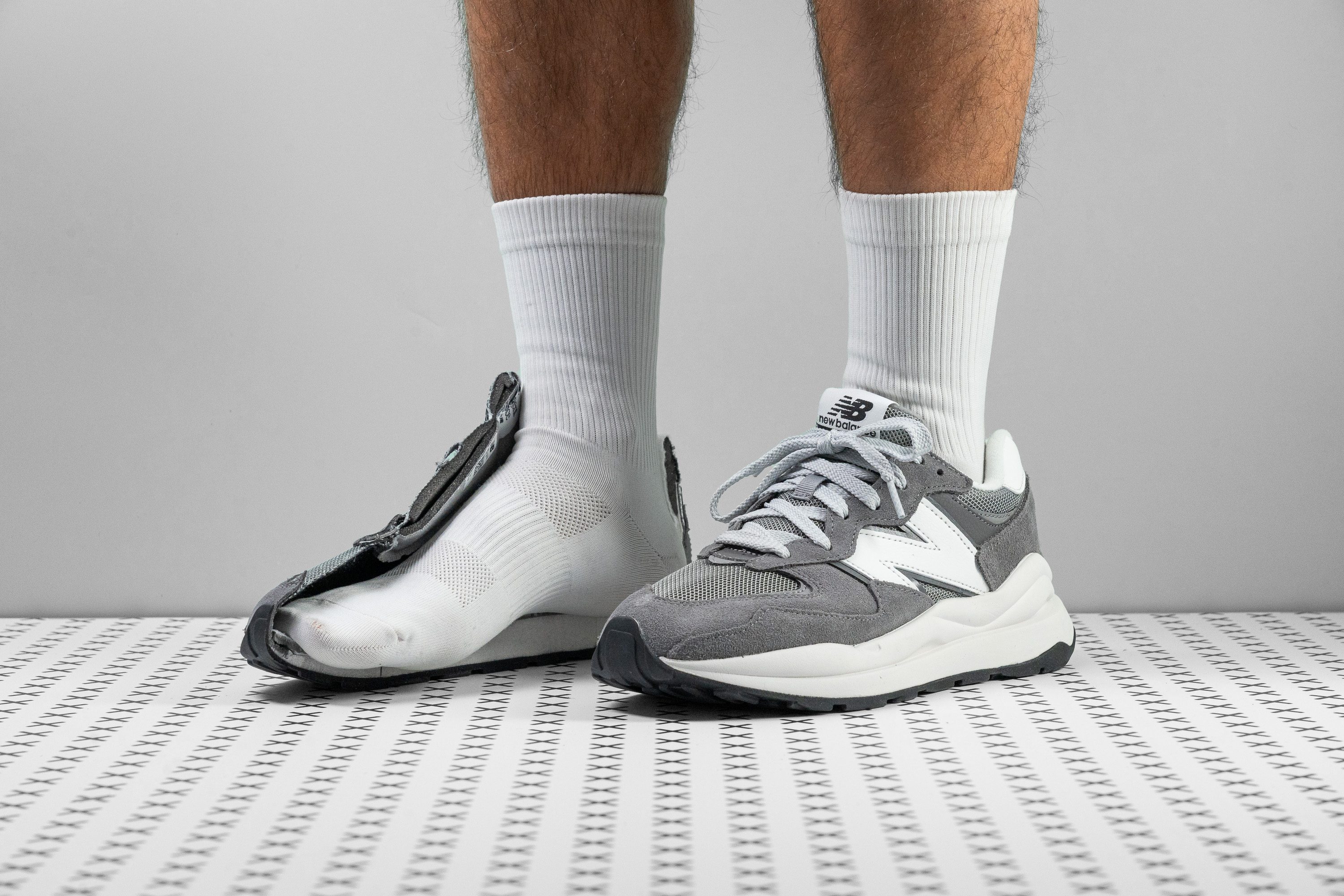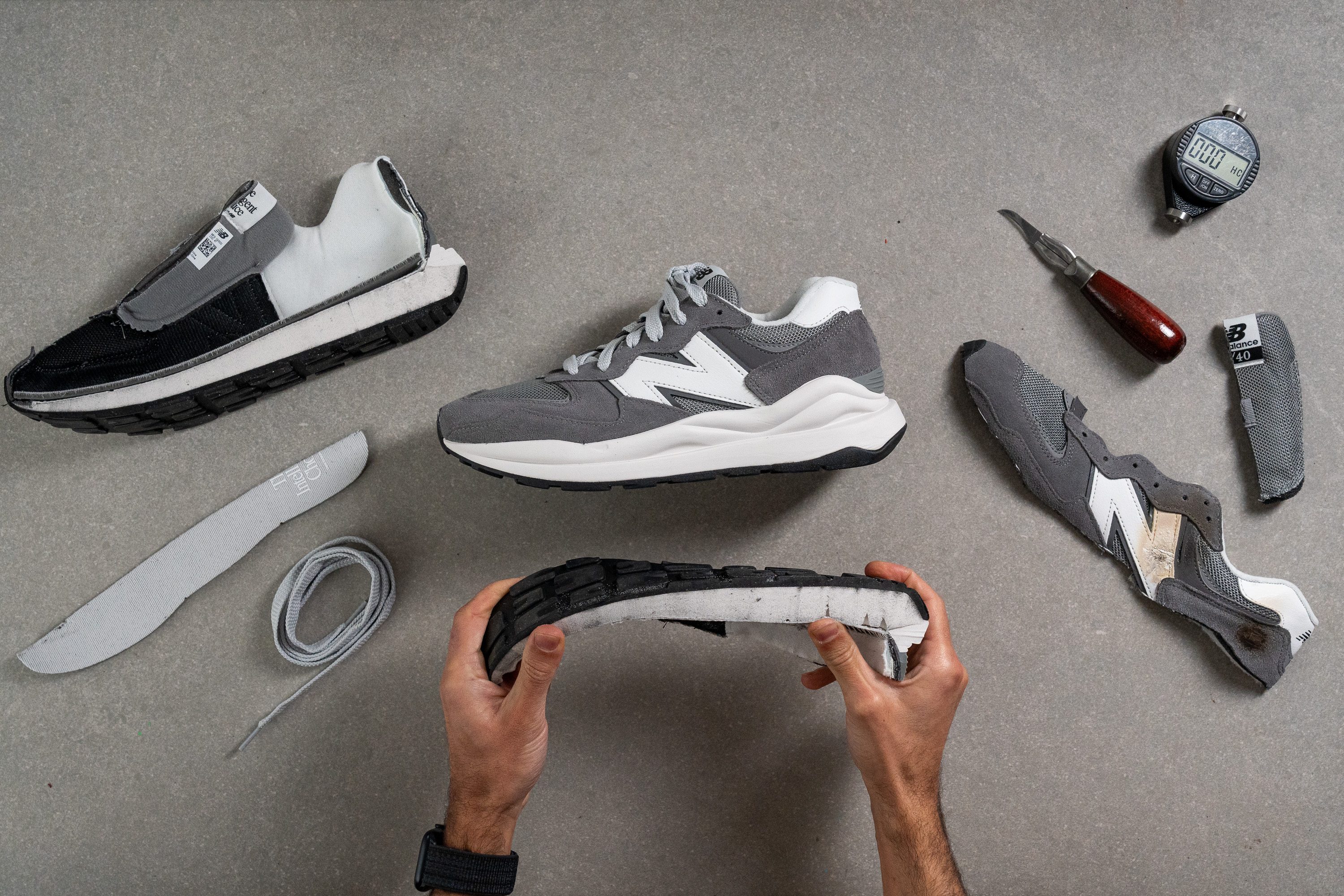Our verdict
Pros
- Cushioned and supportive for all-day wear
- Very wide and stable platform
- Awesome suede quality for the price
- Will outlast most sneakers (highly durable)
- Not heavy considering the chunky look
- Breathable for summer
Cons
- Stiffer than average
- Not reflective as advertised
Audience verdict
Comparison
The most similar sneakers compared
+ + Add a shoe | |||||
|---|---|---|---|---|---|
| Audience score | 88 Good! | 90 Good! | 95 Superb! | 87 Good! | |
| Price | $100 | $90 | $100 | $150 | |
| Style | RetroSporty | RetroSporty | DadRetroSporty | ClassicRetroSportyChunky | |
| Shock absorption | - | High | High | - | |
| Energy return | - | Moderate | Moderate | - | |
| Traction | - | High | High | - | |
| Breathability | Breathable | Breathable | Warm | Breathable | |
| Weight lab | 14 oz / 397g | 10.6 oz / 301g | 12.9 oz / 366g | 14 oz / 397g | |
| Size | True to size | True to size | True to size | True to size | |
| Midsole softness | Balanced | Balanced | Soft | Balanced | |
| Material | MeshSuede | MeshSuede | LeatherMesh | LeatherMeshSuede | |
| Season | SpringFall | SpringFall | SpringFall | Summer | |
| Inspired from | Running | Running | Running | Running | |
| Width / fit | Medium | Medium | Medium | Medium | |
| Toebox width | Medium | Medium | Medium | Medium | |
| Leather/suede quality | Real suede | Real suede | Real leather | Real leather | |
| Toebox durability | Good | Decent | Decent | Decent | |
| Heel padding durability | Decent | Bad | Decent | Decent | |
| Outsole durability | Good | Good | Good | Good | |
| Heel stack lab | 33.5 mm | 35.0 mm | 32.3 mm | 34.8 mm | |
| Stiffness | Stiff | Moderate | Moderate | Stiff | |
| Tongue padding | Average | Very thin | Average | Average | |
| Drop lab | 10.8 mm | 10.0 mm | 10.0 mm | 10.3 mm | |
| Forefoot | 22.7 mm | 25.0 mm | 22.3 mm | 24.5 mm | |
| Removable insole | ✓ | ✓ | ✓ | ✓ | |
| Heel tab | None | None | None | None | |
| Torsional rigidity | Stiff | Moderate | Moderate | Stiff | |
| Heel counter stiffness | Stiff | Moderate | Moderate | Moderate | |
| Reflective elements | ✗ | ✗ | ✗ | ✓ | |
| Closure | Laces | Laces | Laces | Laces | |
| Top | Low top | Low top | Low top | Low top | |
| Ranking | #102 Bottom 15% | #64 Bottom 47% | #6 Top 5% | #104 Bottom 14% | |
| Popularity | #92 Bottom 23% | #13 Top 11% | #3 Top 3% | #80 Bottom 33% |
Who should buy
We were amazed at how much value the New Balance 57/40 offers for the price. In our opinion, it is a solid pick for people who:
- want a practical kick that will support them all day, match any outfit, and last a good while
- prefer real suede and expect high-quality craftsmanship in their sneakers
- deal with overpronation and need a stable and comfortable kick
- love chunky silhouettes minus the heaviness
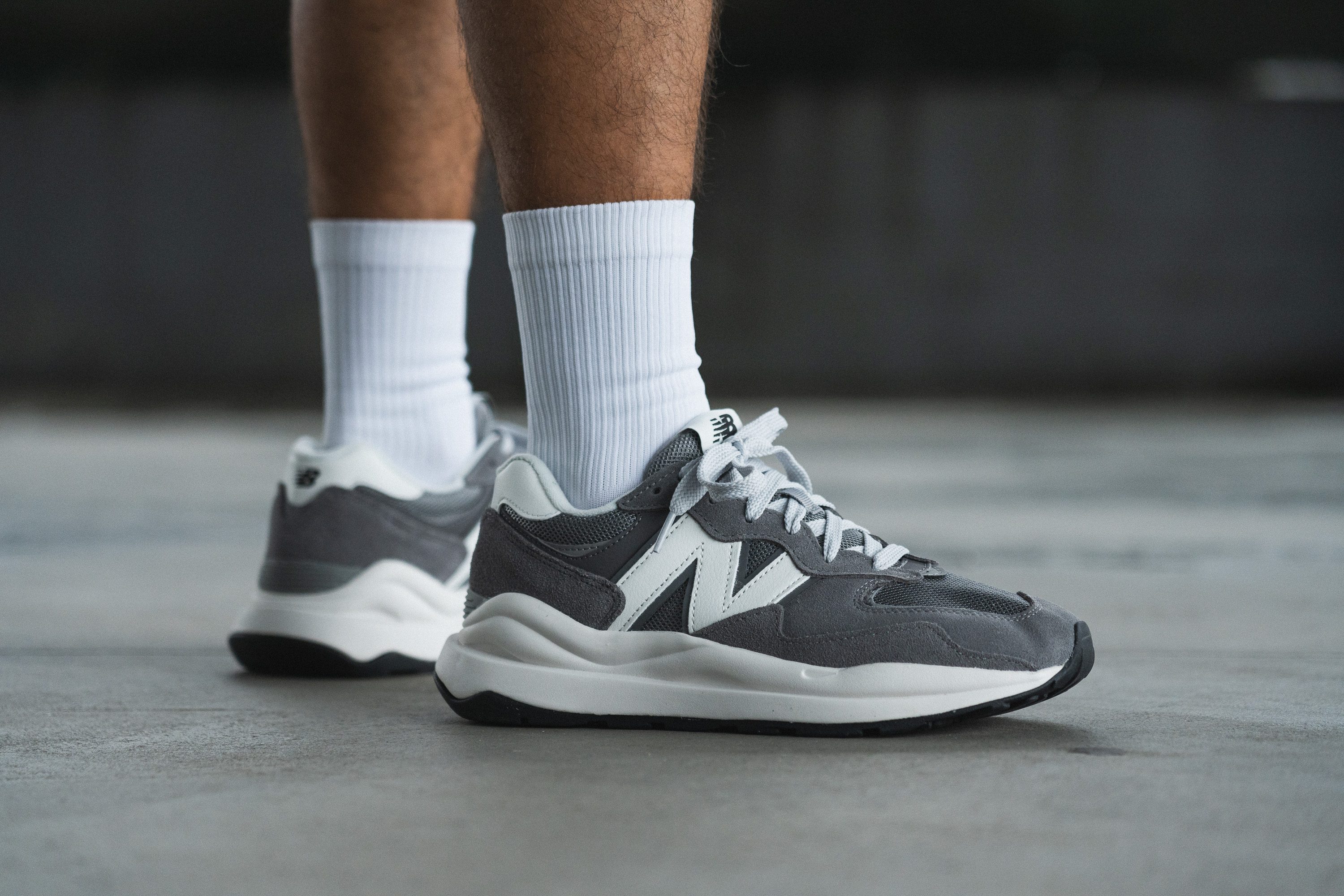
Who should NOT buy
Cushioning
Heel stack
If you like platformy sneakers but don't want to go too crazy, the NB 57/40 will help you meet that sweet spot in between. Its slightly taller-than-average heel stack of 33.5 mm offers a sense of substance underfoot without feeling like a drag.
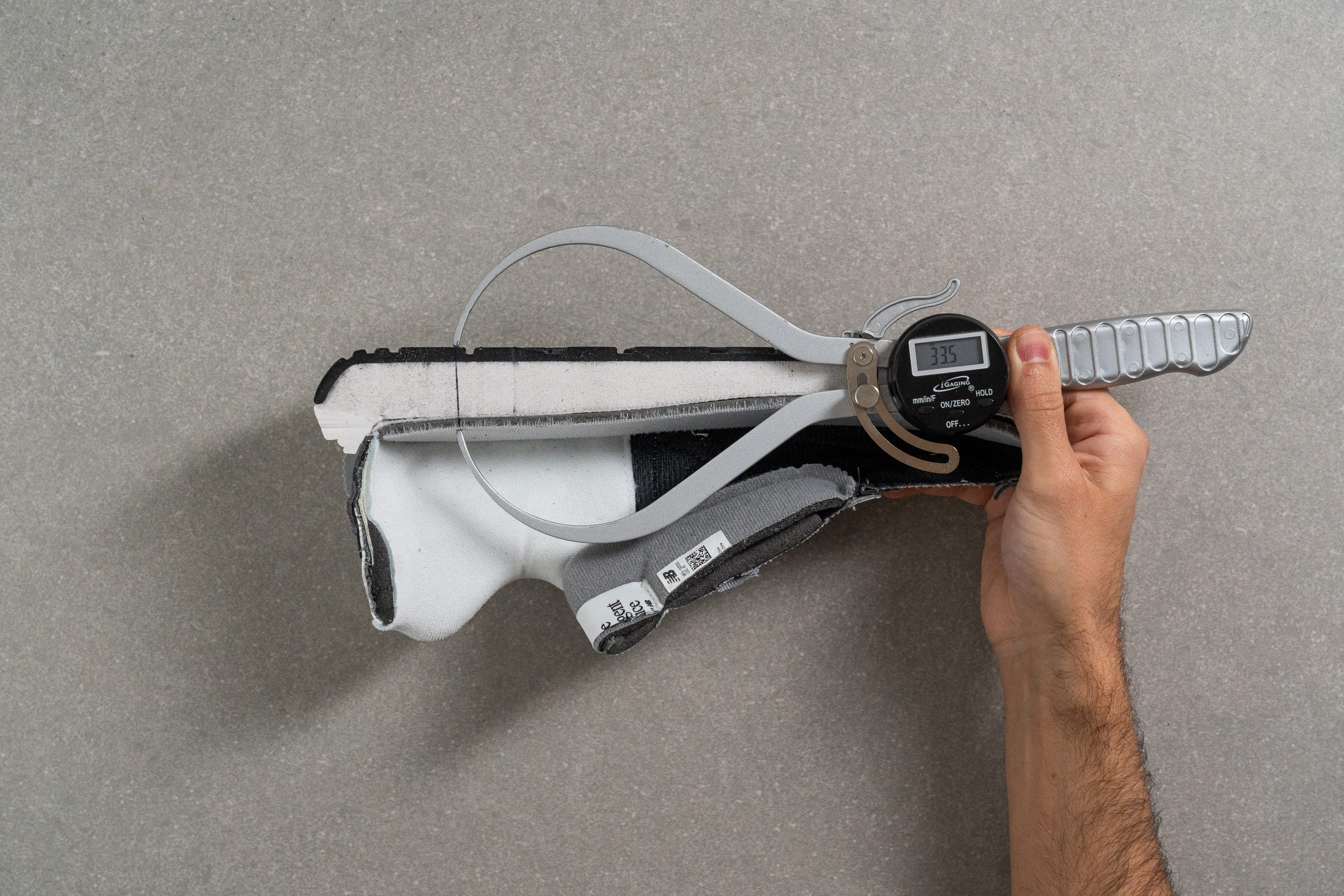
| 57/40 | 33.5 mm |
| Average | 30.7 mm |
Forefoot stack
Measuring the shoe's forefoot stack, we found that it's also a bit taller than average at 22.7 mm. That amount of rubber and foam is sufficient to mute out the poking of small rocks underfoot.
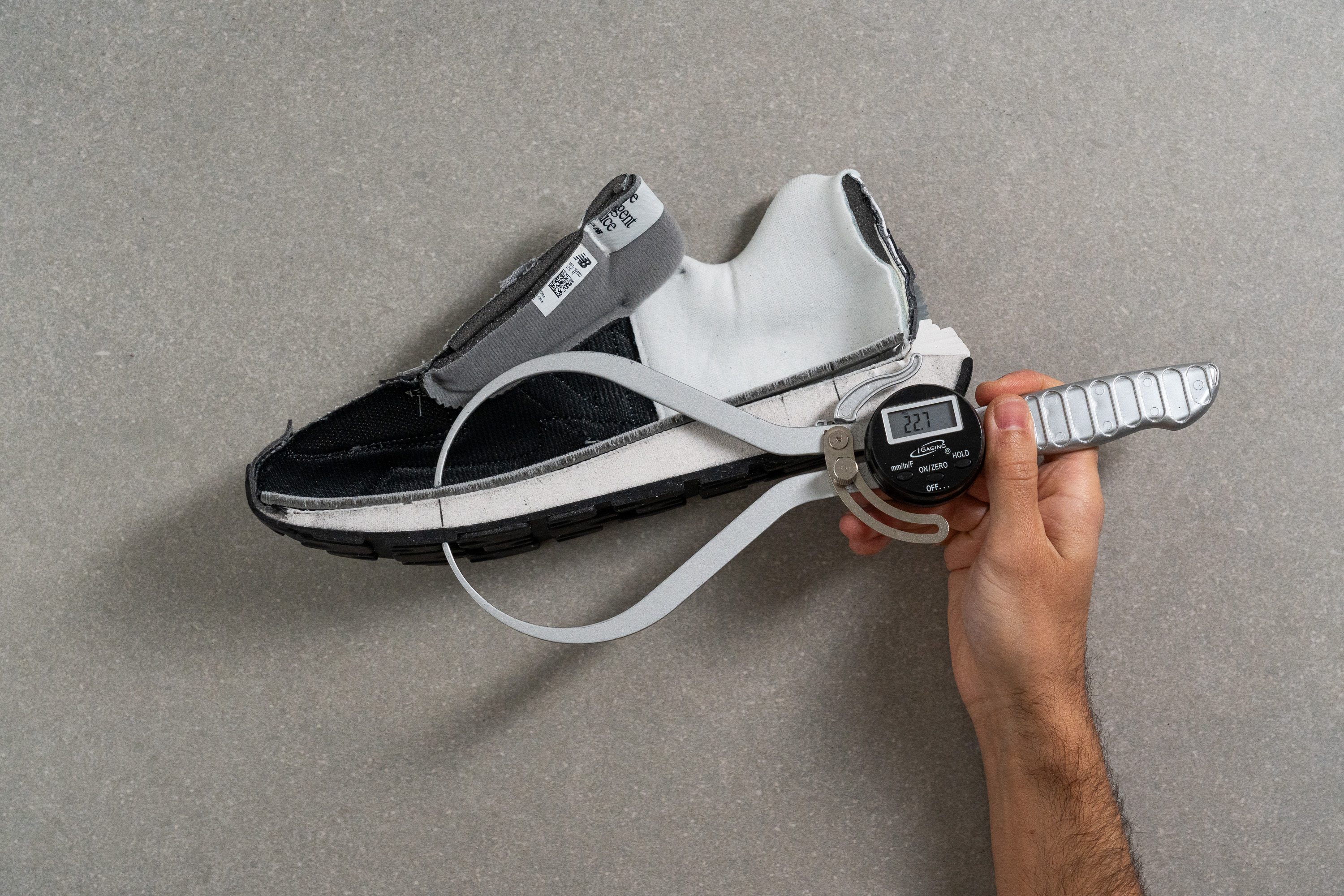
| 57/40 | 22.7 mm |
| Average | 19.5 mm |
Drop
The difference in stack heights gives us an offset of 10.8 mm in the NB 57/40. It means that the wearer's heel sits about a centimeter higher than the toes inside the shoe.
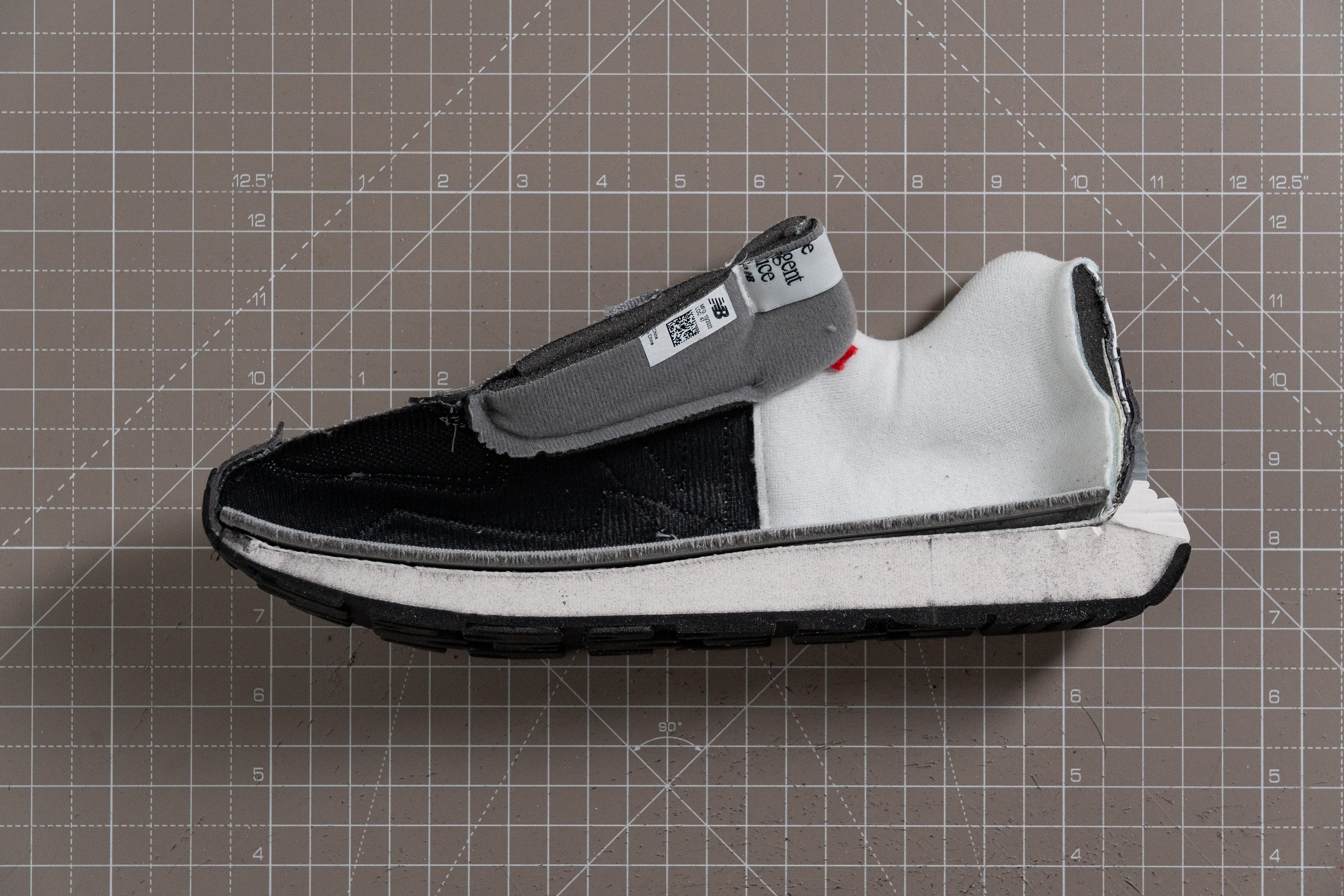
We believe that this setup is going to feel at home for most people because it is typical for most sporty sneakers.
When the heel is moderately elevated above the forefoot, the Achilles and calves feel less pressure and it makes you feel more supported as well.
| 57/40 | 10.8 mm |
| Average | 11.2 mm |
Midsole softness
The cushioning of the NB 57/40 felt very nicely balanced during our wear tests. There was enough plushness to enjoy as well as firmness to provide stability.
We used a Shore A durometer to stack up the shoe's foam softness against other sneakers. With a reading of 22.3 HA, it turned out to be 30% softer than the average! It is not in the plush range but still softer than most other New Balance kicks including the 574 (97% softer!).
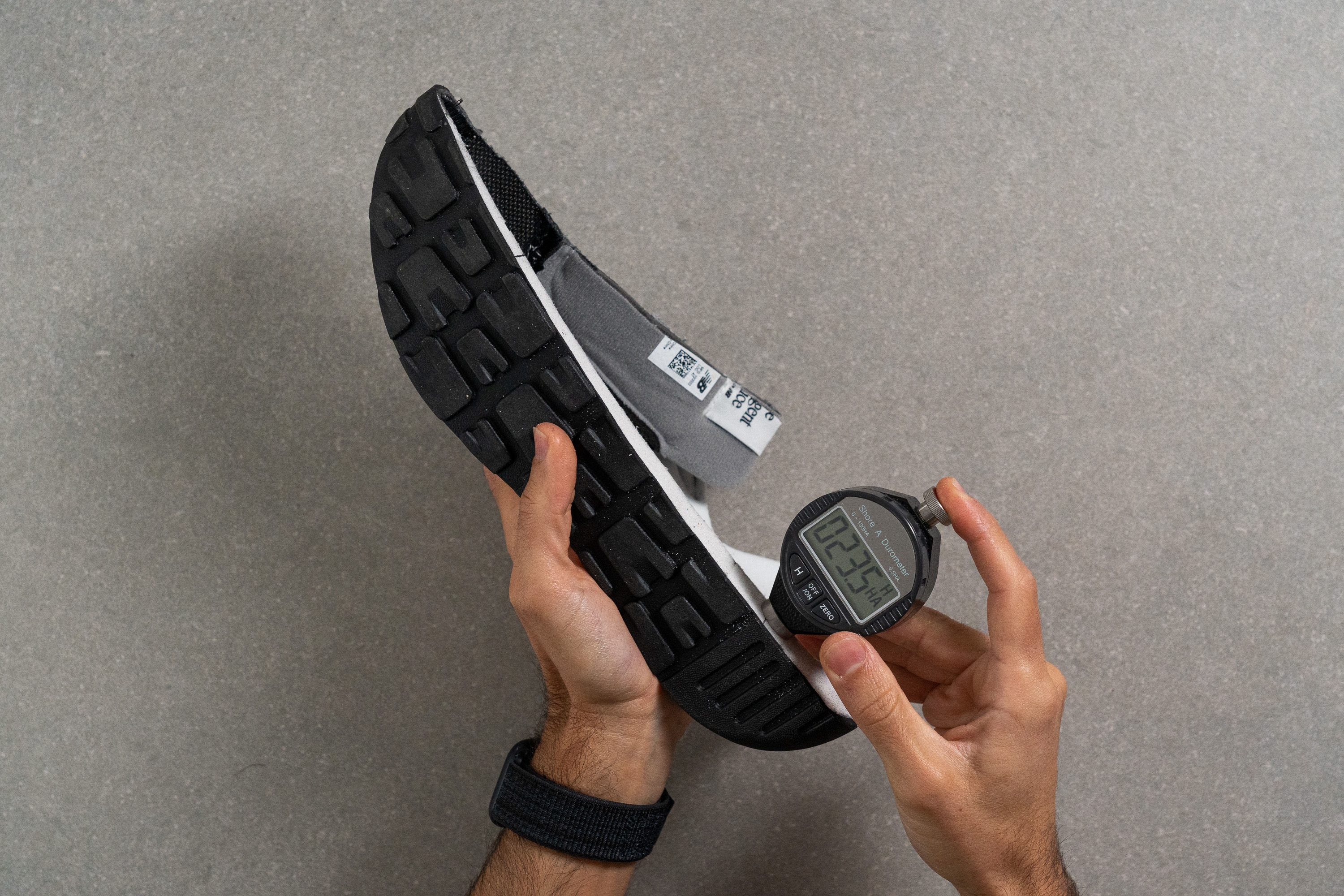
But keep in mind that the shoe's carrier foam and firm rubber outsole dampen some of that primary foam plushness.
| 57/40 | 22.3 HA |
| Average | 28.6 HA |
Size and fit
Size
New Balance 57/40 fits true to size (25 votes).
Internal length
| 57/40 | 270.5 mm |
| Average | 272.3 mm |
Width / Fit
Our wear test showed that the NB 57/40 offers that predictable, feel-good medium fit of a New Balance sneaker. And the gel mold of the shoe's interiors only confirmed it.
Measuring the widest part of the mold with a caliper, the tool returned a standard reading of 92.2 mm. Exactly as expected in a D medium width.
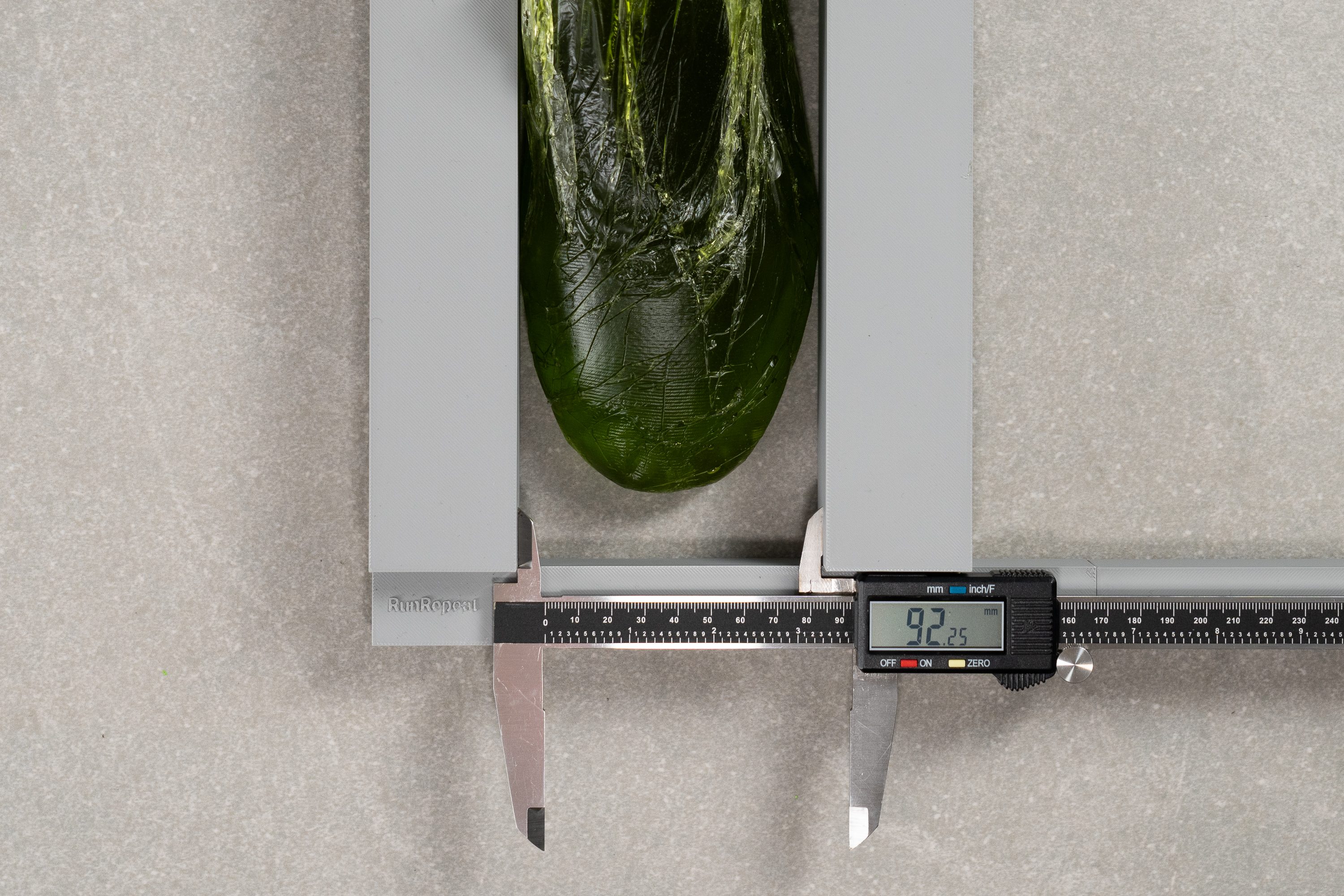
| 57/40 | 92.2 mm |
| Average | 92.5 mm |
Toebox width
Moving the caliper forward to the big toe area, we got an above-average width of 71.6 mm which correlates with the rounded shape of the mold.
It is a nice touch of wiggle room which remains accommodating after hours of walking.
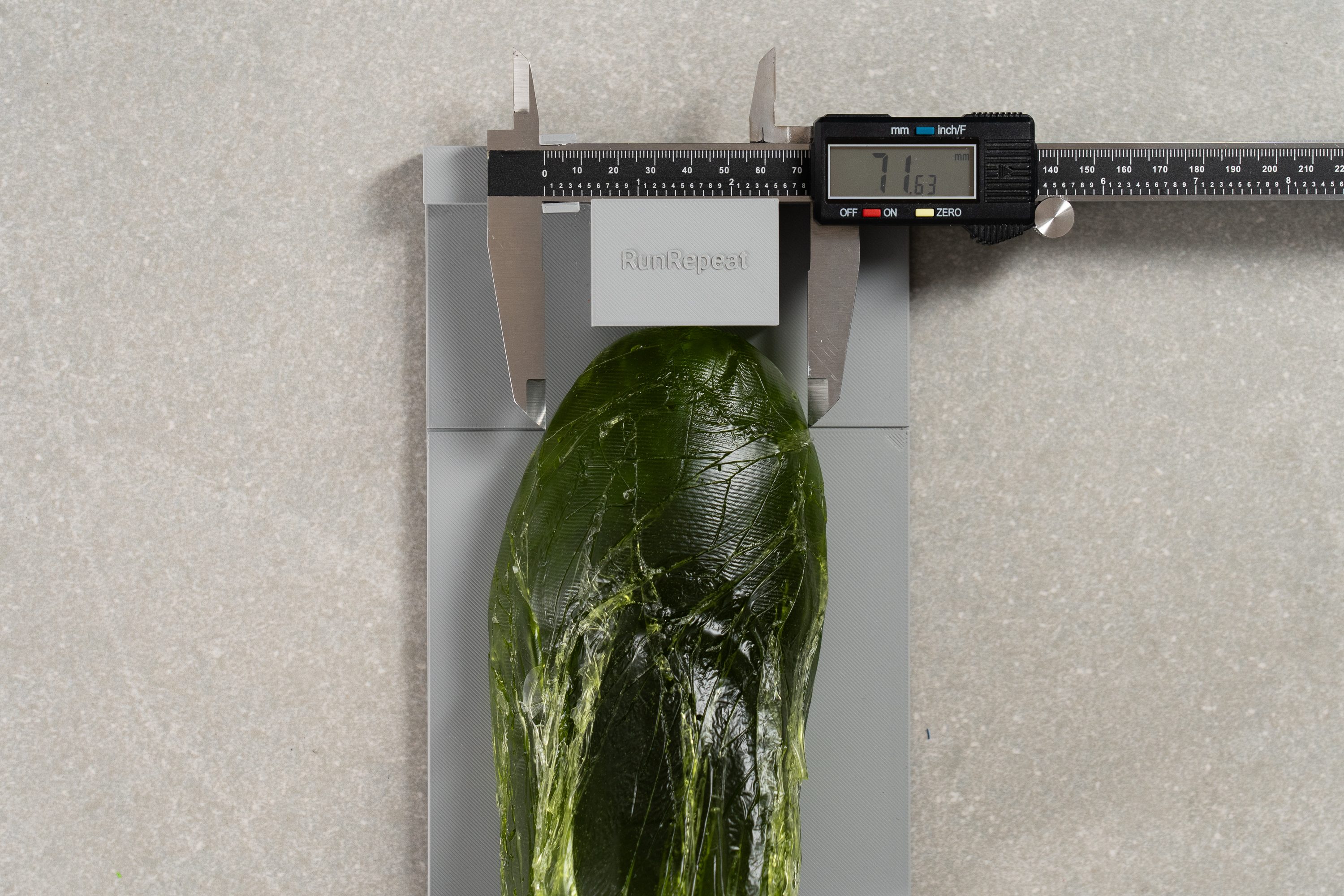
| 57/40 | 71.6 mm |
| Average | 68.9 mm |
Toebox height
An exceptionally tall toebox height amplifies the shoe's roomy fit. With a caliper reading of 34.5 mm, it creates plenty of space on top of the toes.
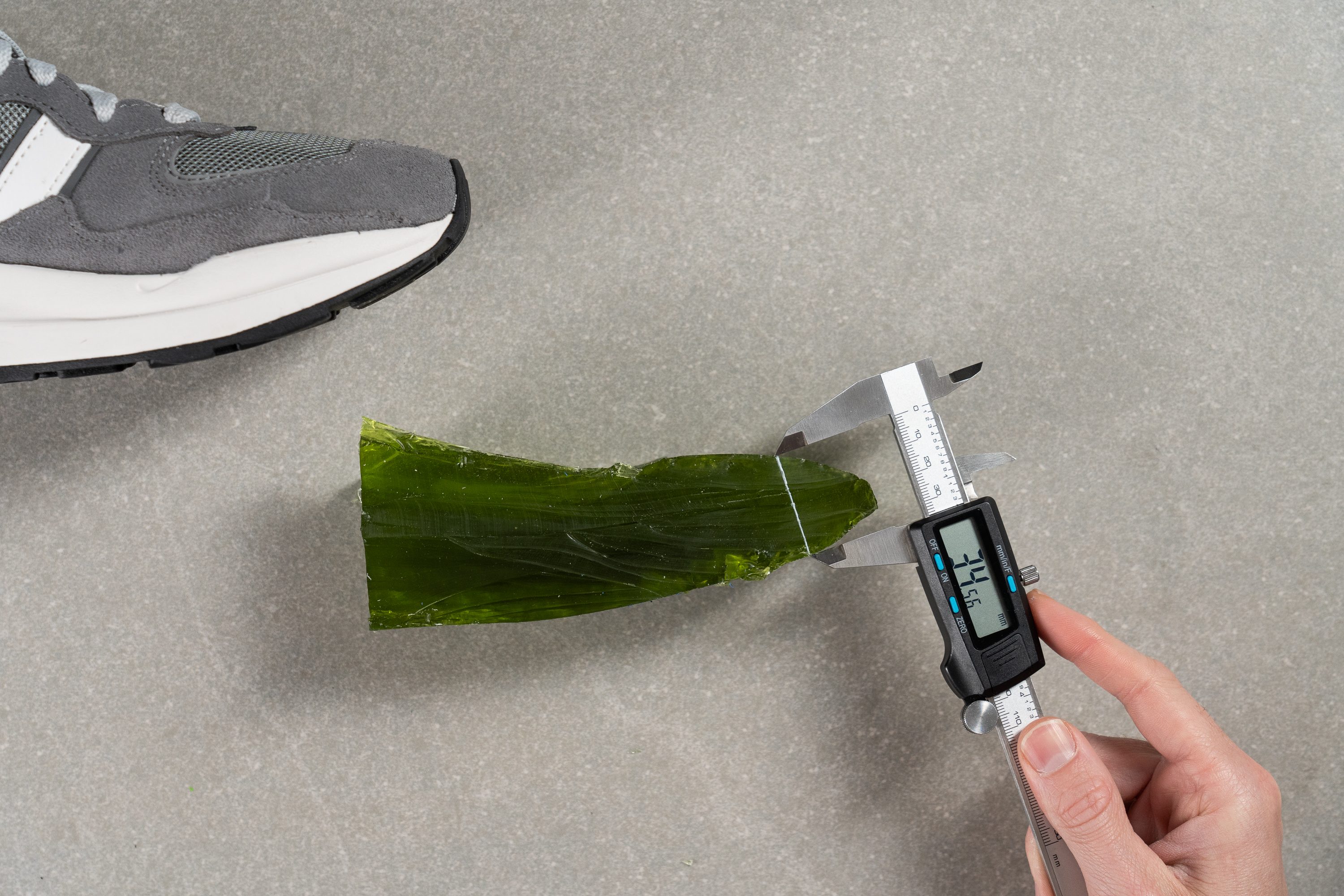
While this prevents the upper material from pressing on the toes, it also takes some style points away with all that bunching.
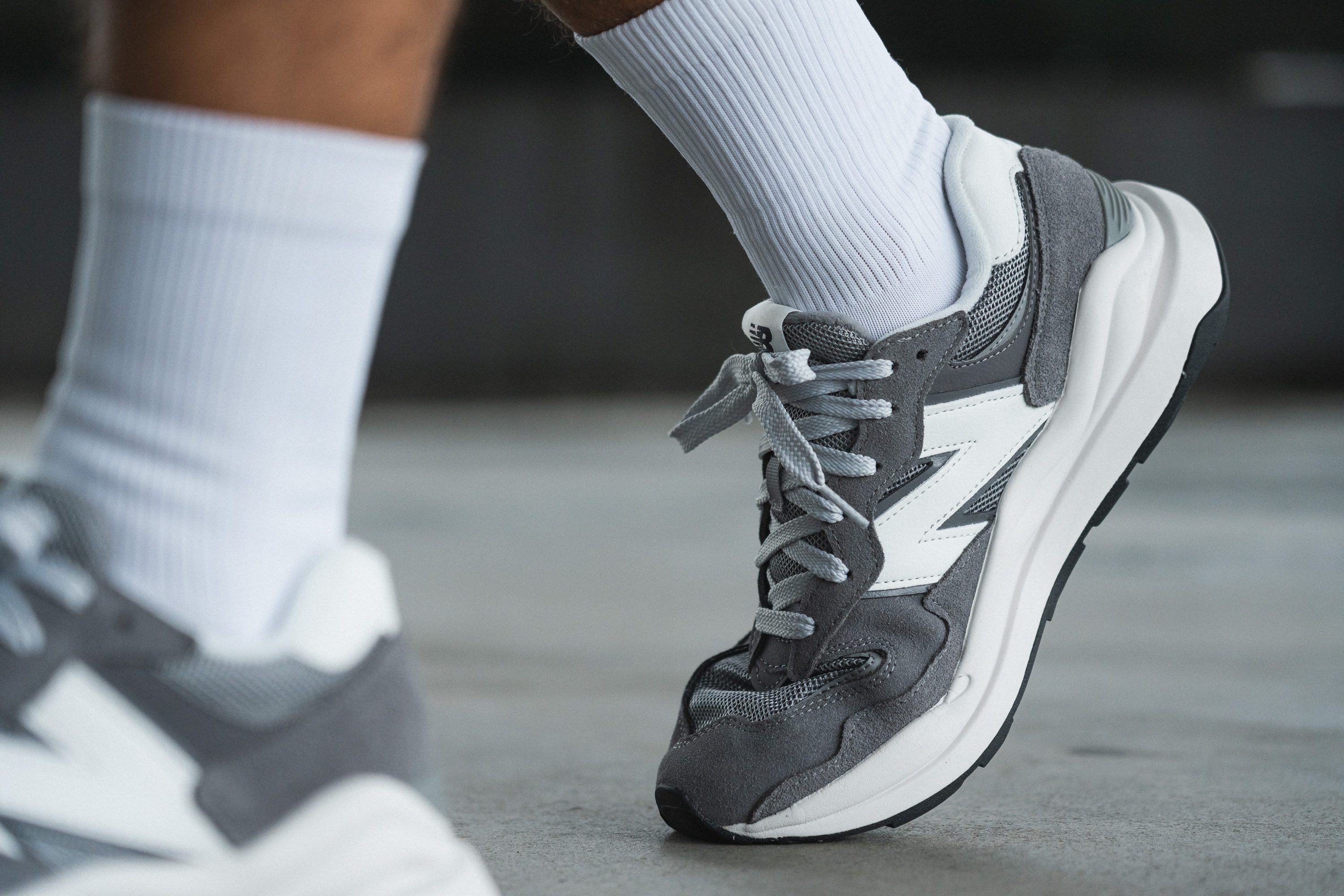
| 57/40 | 34.5 mm |
| Average | 27.8 mm |
Laces
The shoe's laces are flat and wide. Our wear tests showed that they stay tied nicely and don't require a double knot.
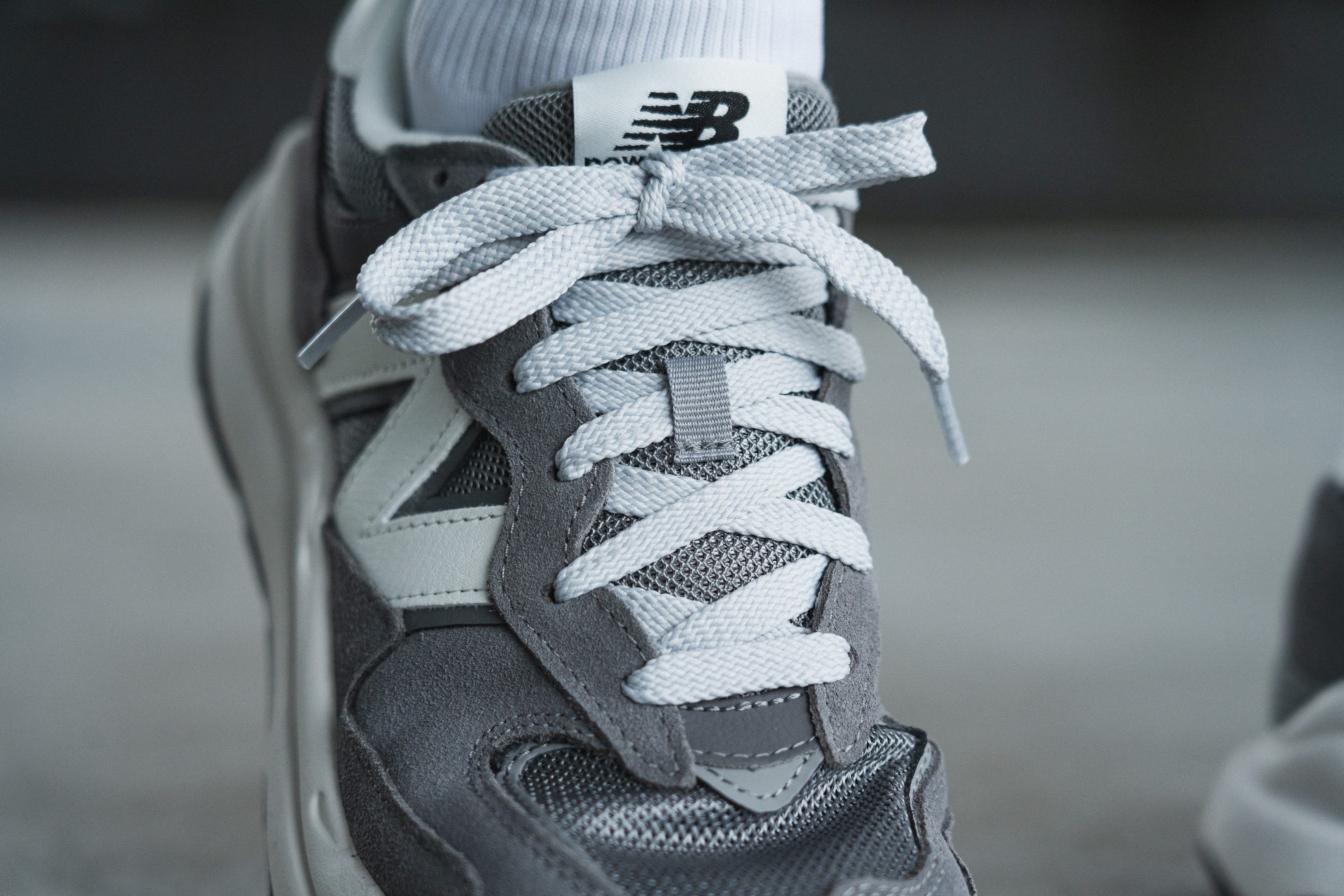
Flexibility / Stiffness
The shoe's less flexible profile is the price to pay for its amazing stability.
Measuring precisely how much force it takes to bend this kick to a 90-degree angle, we got 32.1N on the force gauge. That's 40% more than it takes an average sneaker.
But even though it doesn't flex as easily as most other shoes, we never felt as if its stiffer design affected the overall comfort.
This test follows an older methodology, which is why you don't see recently tested shoes in the chart. Results from different methodologies can not be compared.
| 57/40 | 32.1N |
| Average | 23.3N |
Weight
Just because it looks heavy-set doesn't mean that the 57/40 has to be heavy on foot!
Checking its weight in a men's US size 9, we got nothing more but an average reading of 14.0 oz (397g).
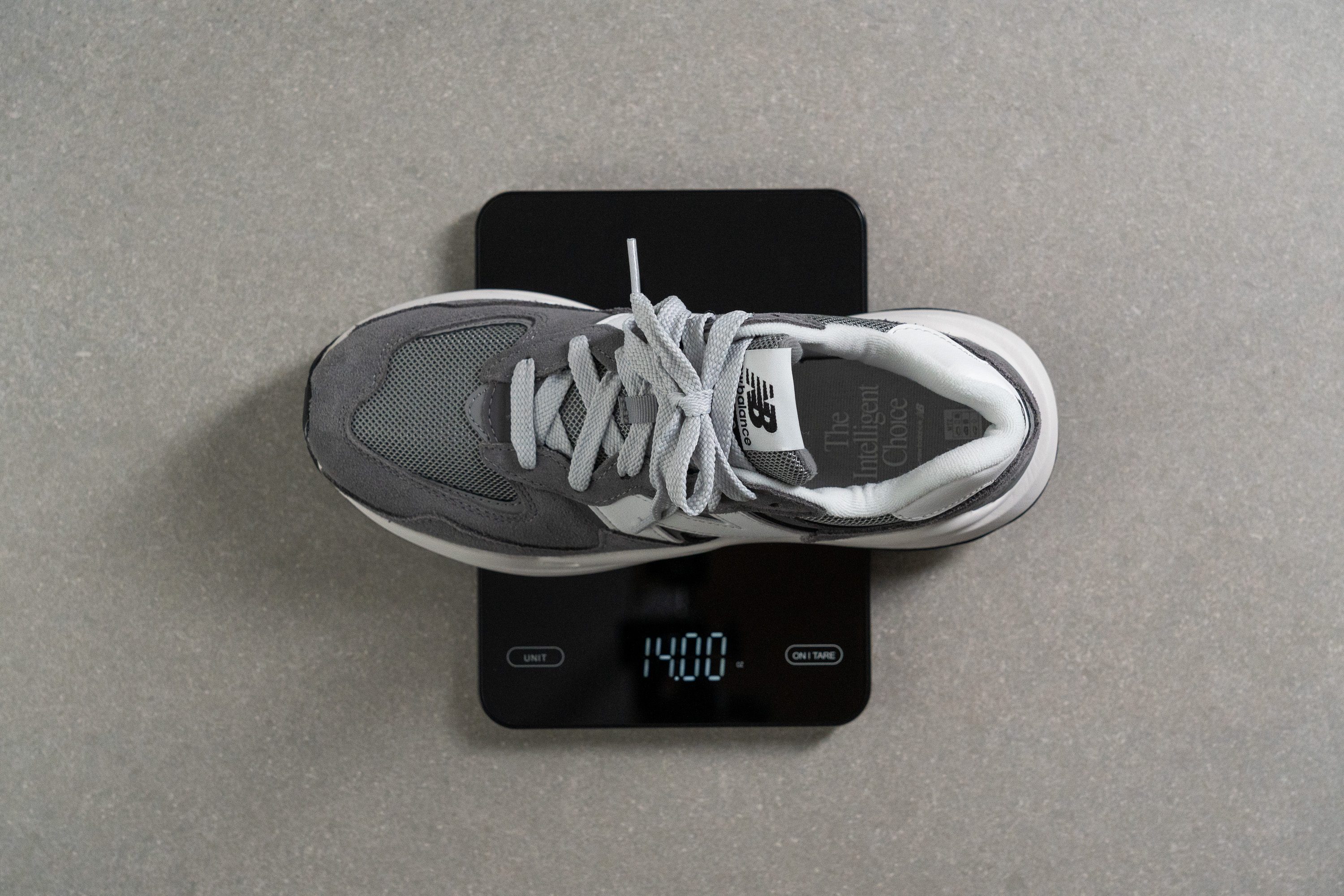
We loved how this New Balance shoe felt chunky without weighing us down.
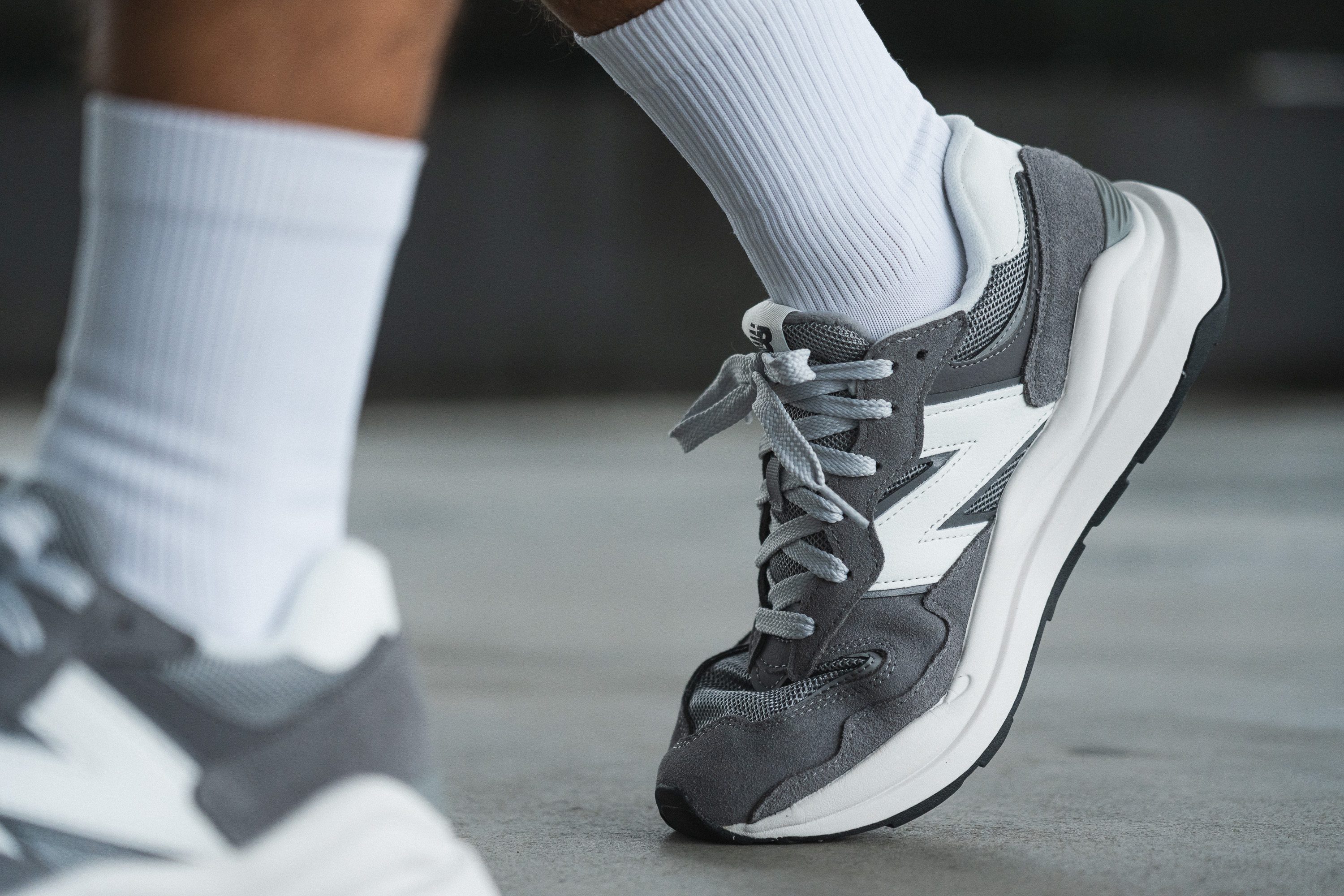
| 57/40 | 14.0 oz (397g) |
| Average | 13.8 oz (390g) |
Breathability
If you think that a sneaker can't be chunky and breathable at the same time, the New Balance 57/40 is here to bust that myth.
We discovered that the mesh panels on its upper have an excellent ventilation capacity. It is clearly seen in our smoke-pumping test above. Look how steadily the vapor is being expelled through the toebox area!
Hovering the shoe's half-cut upper over a source of light, we were amazed at how actually thin and transparent the mesh is!
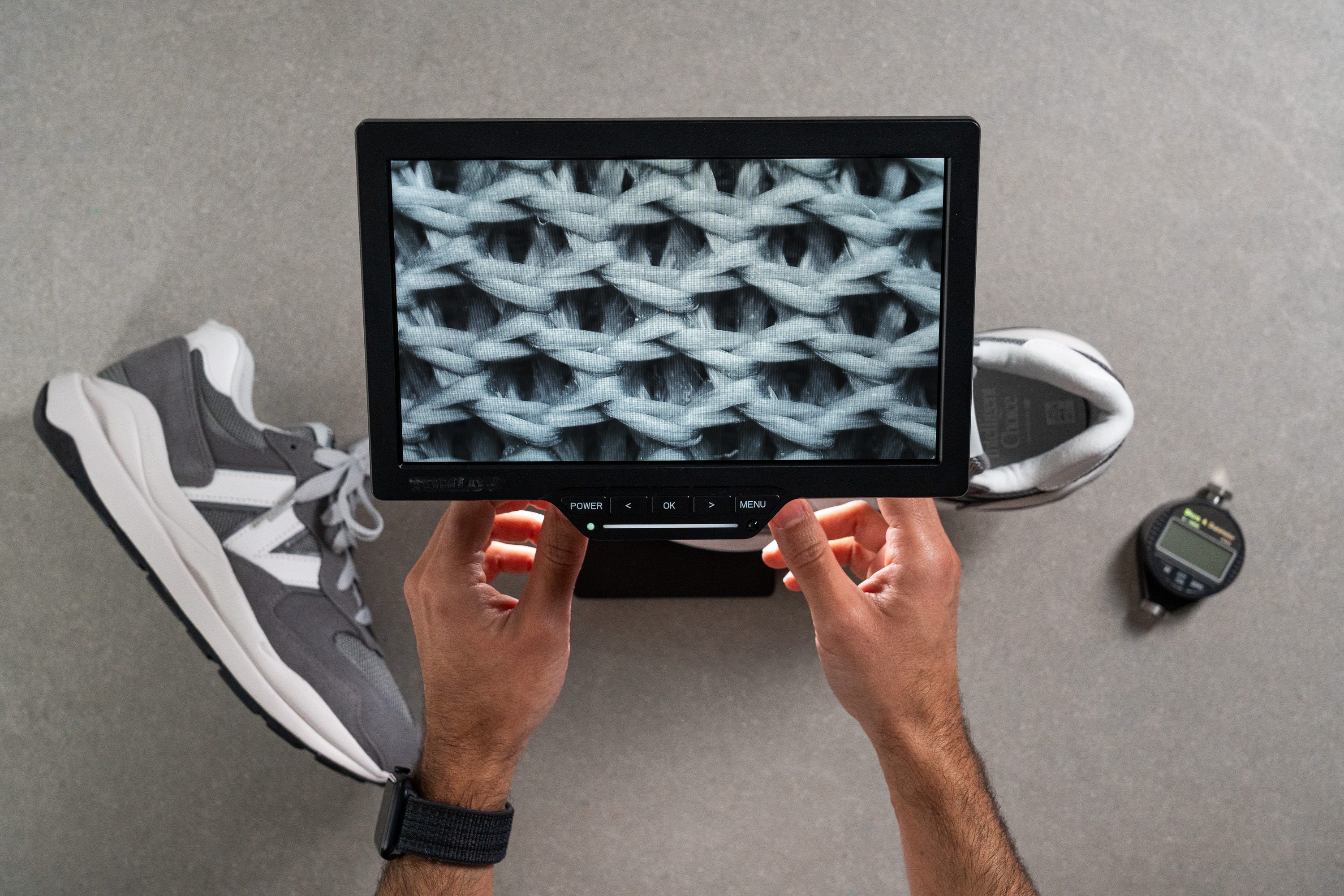
A closeup view through our microscope also releaved the spaced-out chainlinking of the upper fabric.
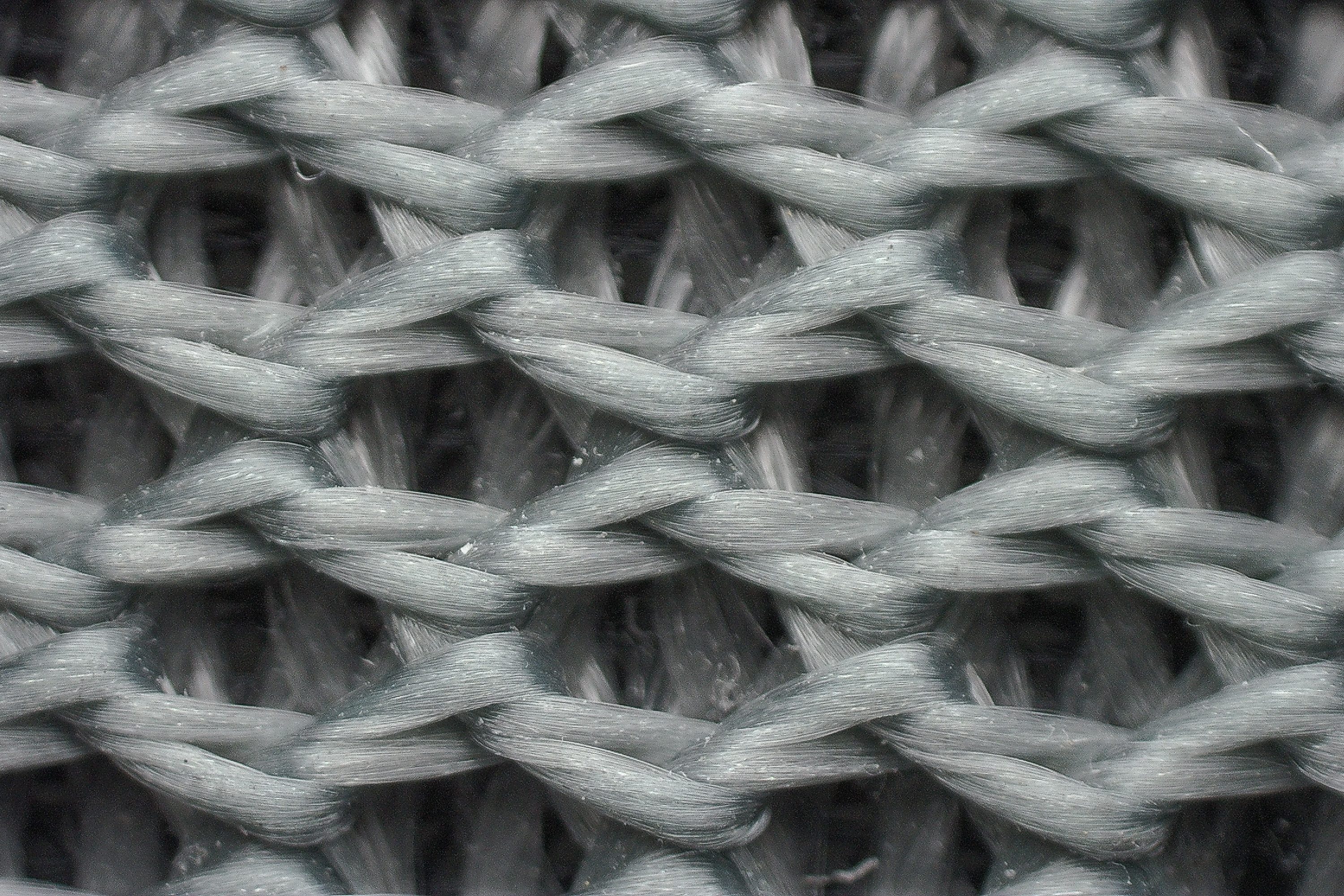
These gaps channeled a nice and steady airflow into the 57/40 during our weartest.
Feeling that light breeze on our toes was convincing enough to rate the breathability of this New Balance sneaker with a high score of 4!
| 57/40 | 4 |
| Average | 3 |
Stability
Lateral stability test
A nice and stable sneaker that keeps our feet supported all day long? Yes, please!
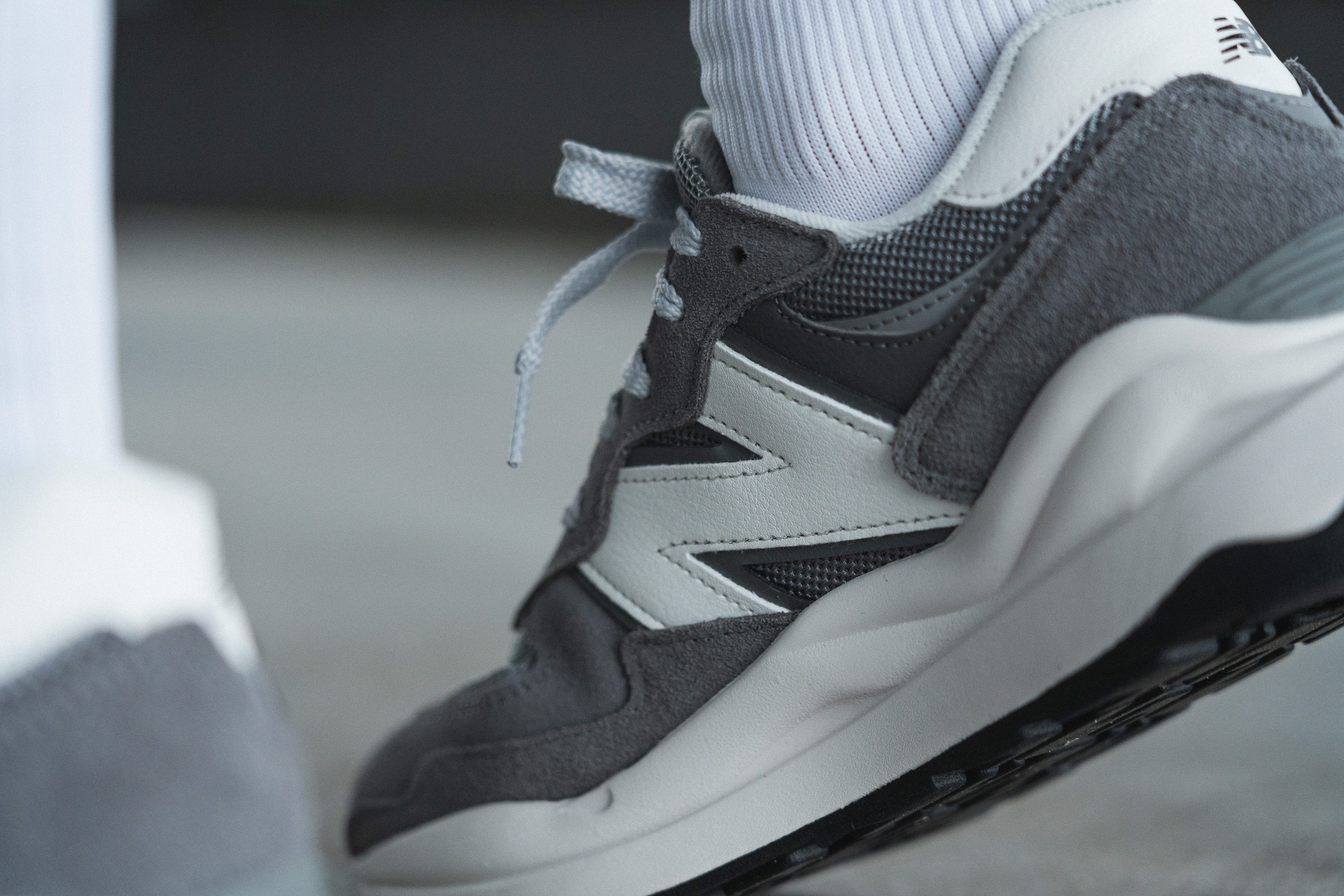
New Balance takes arch support seriously, even in its casual sneakers. The 57/40 gave us a super solid footing with plenty of side-to-side support.
Testing the shoe's lateral stability with a shifty ankle movement, we could not imagine our feet buckling in this setup at all!
Torsional rigidity
The shoe's extended midsole sidewalls, sturdy upper overlays, and other less obvious details add a lot of stiffness to the 57/40.
The sneaker was so reluctant to be twisted in our manual test that we readily gave it the highest rigidity score of 5.
We are convinced that folks with excessive inward ankle rolling (overpronation) can benefit from this New Balance sneaker in their day-to-day wear.
| 57/40 | 5 |
| Average | 3.6 |
Heel counter stiffness
The New Balance 57/40 features a heel clip that's very similar to that on the 574. But as you can see, the 57/40 has it sandwiched in between two tall sidewalls for even better stability.
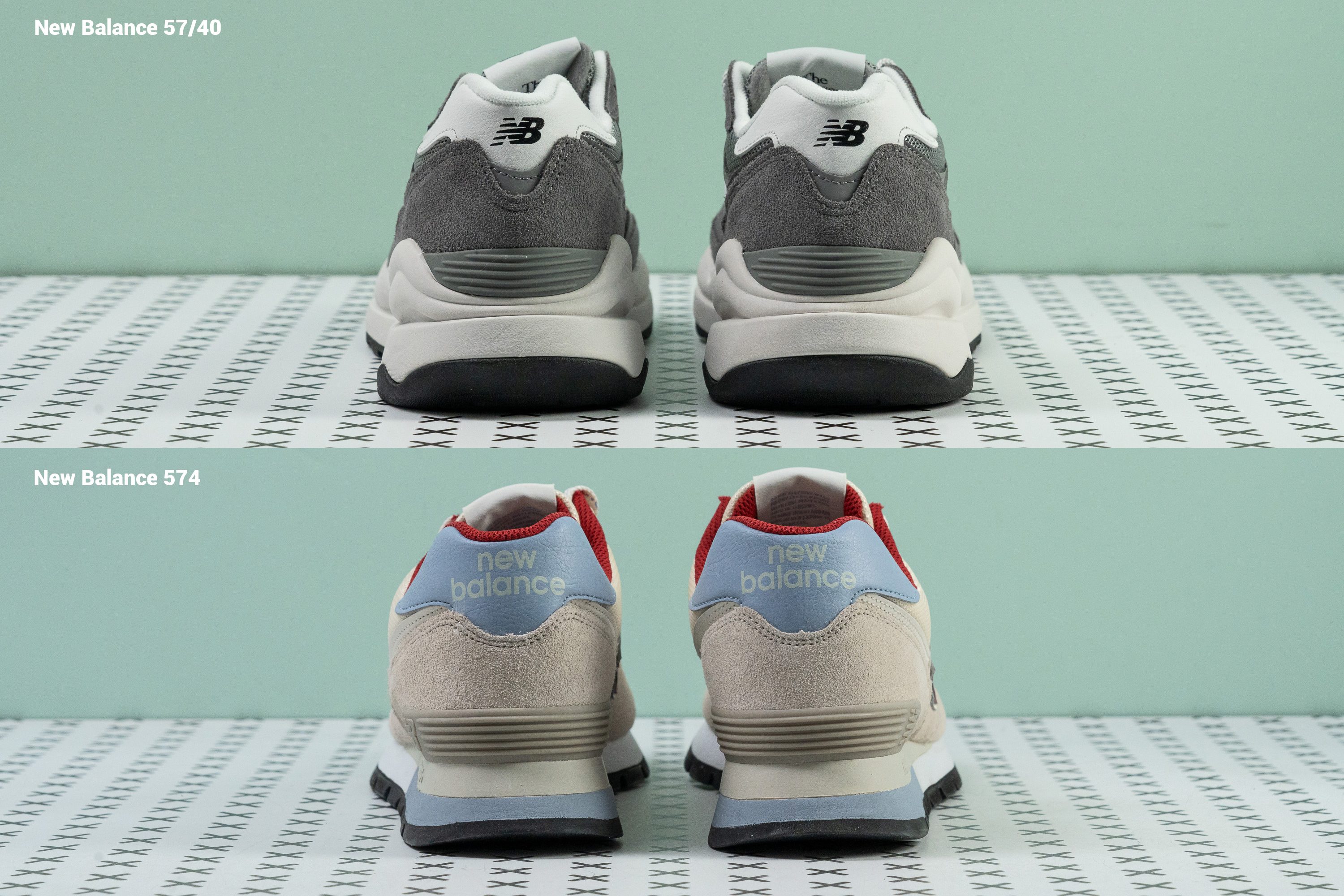
Checking the shoe's heel counter stiffness in our manual test, we discovered that even though the collar is somewhat pliable, the bottom of the heel counter (where the clip is located) is immovable.
Thus, we rated the shoe's heel counter stiffness with a high score of 4. It did an amazing job holding the back of our foot very firmly in place.
| 57/40 | 4 |
| Average | 3.2 |
Midsole width - forefoot
The landing area of the New Balance 57/40 is VERY broad. As in top-five-widest-we've-seen broad.
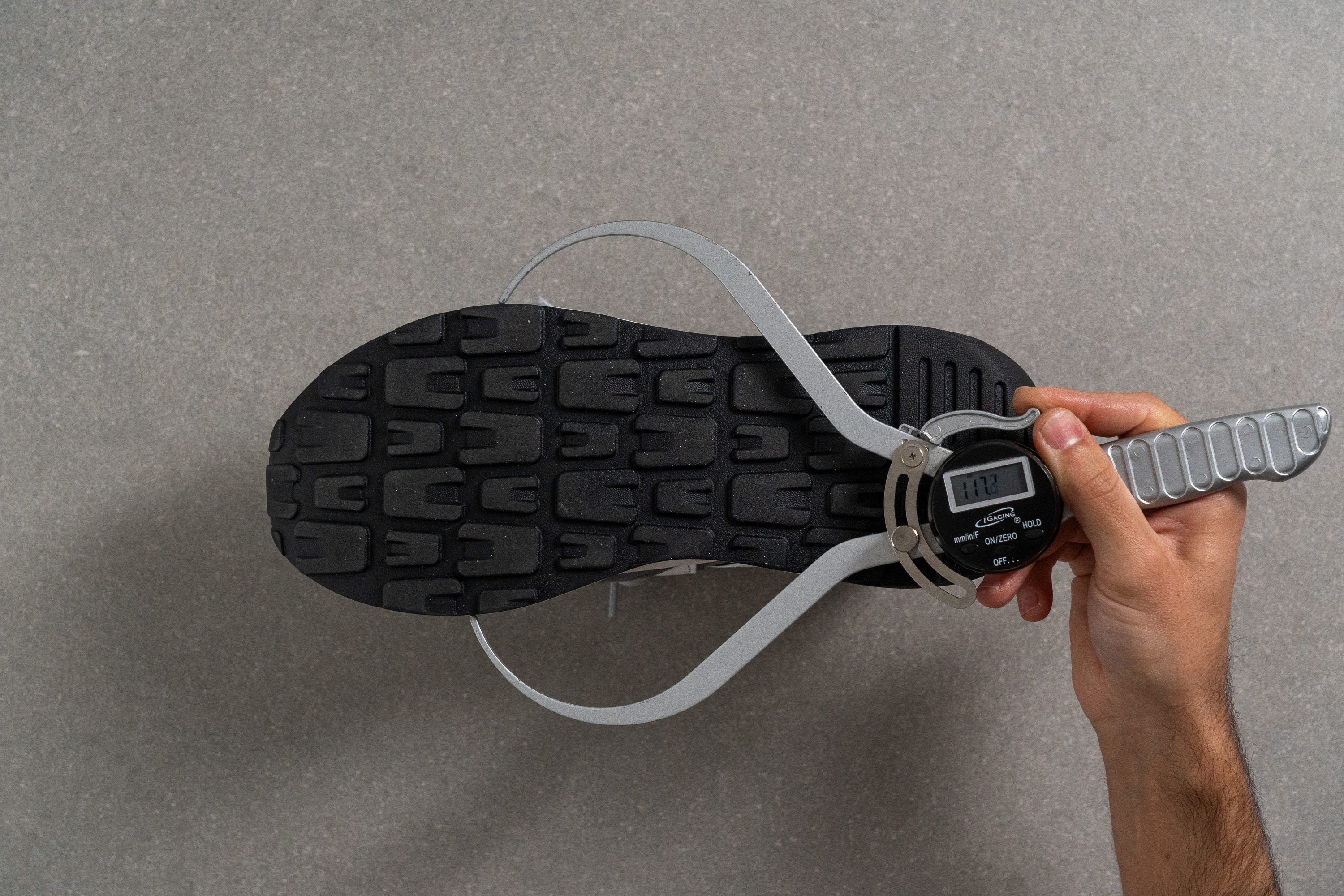
Our caliper shows 117.2 mm in the widest area of the forefoot which is about 8.5 mm wider than average!
| 57/40 | 117.2 mm |
| Average | 108.9 mm |
Midsole width - heel
You already saw how much bigger the 57/40's heel is compared to the 574 in the comparison photo above. And our caliper measurements only confirmed that.
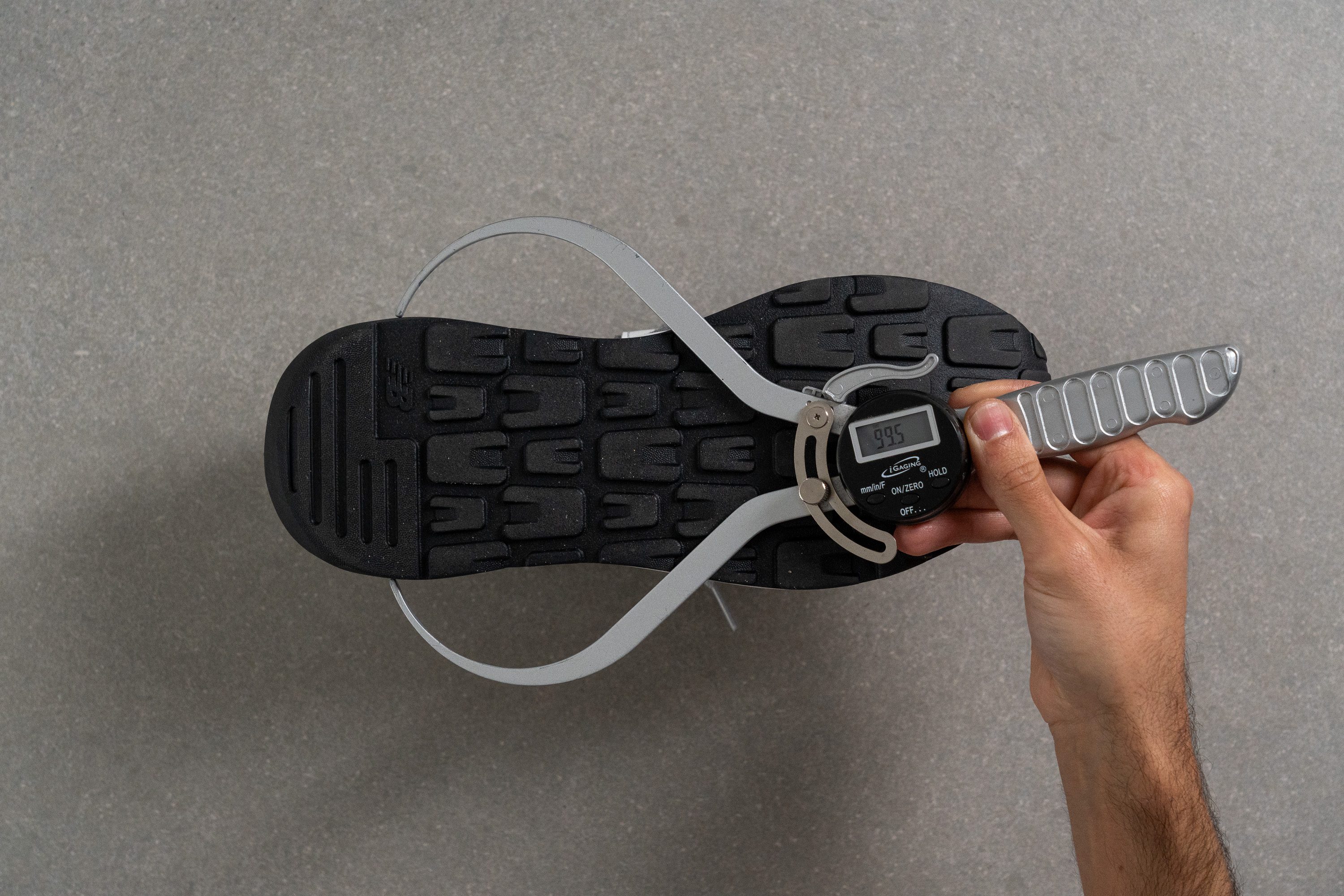
The widest part of the shoe's heel showed 99.5 mm on the caliper, whereas the same area reached only 80.2 mm in the 574.
| 57/40 | 99.5 mm |
| Average | 84.0 mm |
Durability
Leather/Suede quality
Time to bust yet another myth! The NB 57/40 proves that an affordable sneaker can still be made with real suede!
Smooth and velvety to the touch, the material makes the shoe look more expensive than it actually is.
To make sure the suede is indeed real, we exposed it to fire using our butane torch. As you can see, it did not squirm, melt, or catch fire. Its topmost layer crumbled as we scratched the burnt area with a leather awl, just like real suede would. No more doubts about it - the suede is real!
Which can't be said about the shoe's N logo.
The fake nature of this detail was quickly revealed in our fire test. The logo screamed synthetics as it burned and melted.
| 57/40 | Real suede |
Toebox durability
The New Balance 57/40 inherits a toebox overlay (a.k.a. mudguard) from the 574 to keep the thin mesh protected from the wear and tear of daily use.
This nice and thick layer of suede fabulously fought off the 12-second sandpaper attack of our Dremel. The 5K RPM speed was no joke!
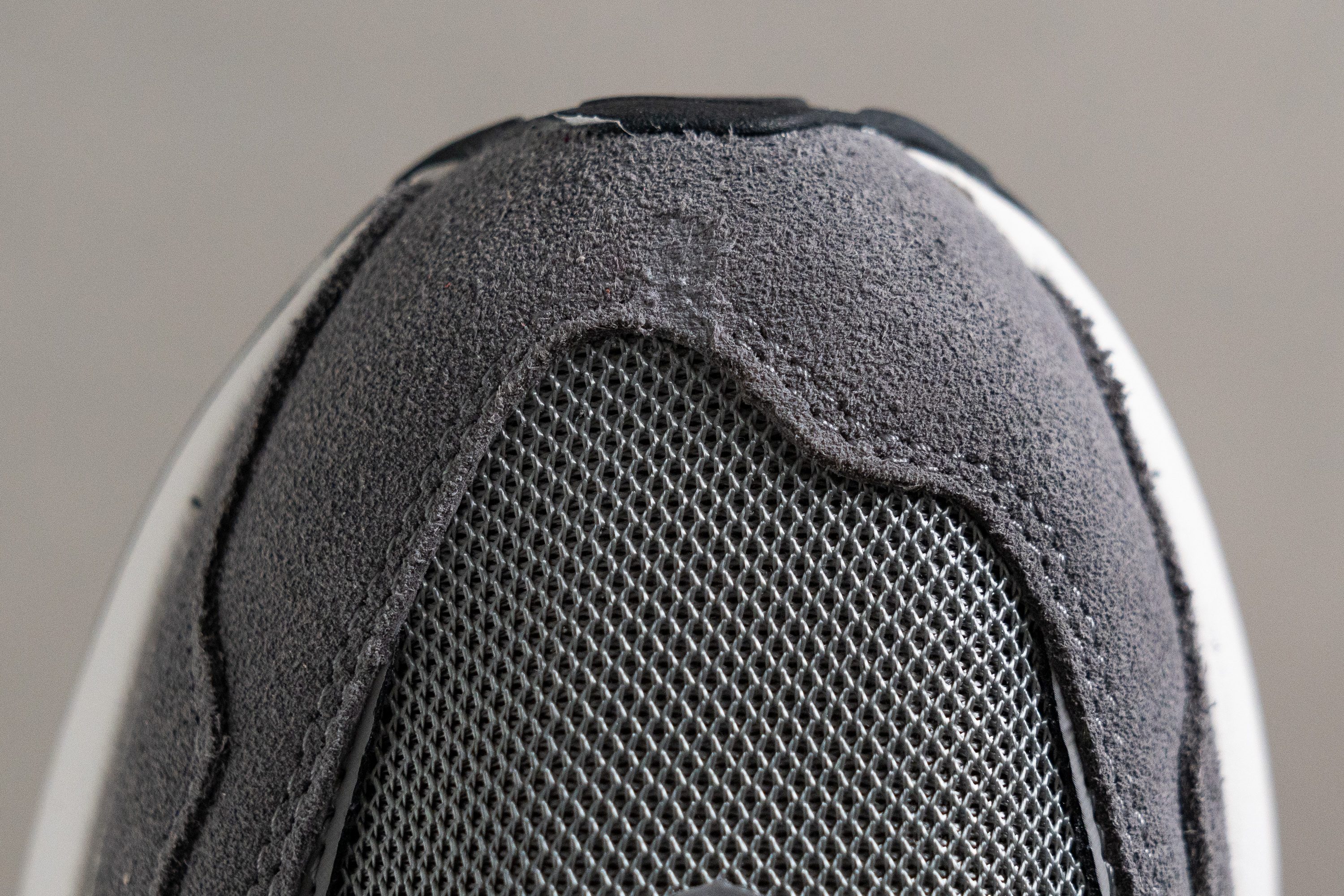
Because the damage can hardly even be considered cosmetic, we rated the shoe's toebox durability with the maximum score - 5 out of 5!
| 57/40 | 5 |
| Average | 3.7 |
Heel padding durability
Another delicate part of every sneaker is the inner lining in the rearfoot. It sustains a great deal of friction from the bony parts of the heels and ankles.
Does the terry-like lining of the New Balance 57/40 live up to the challenge?
In fact, it does! After a 4-second drilling session, the textile showed almost no signs of abrasion!
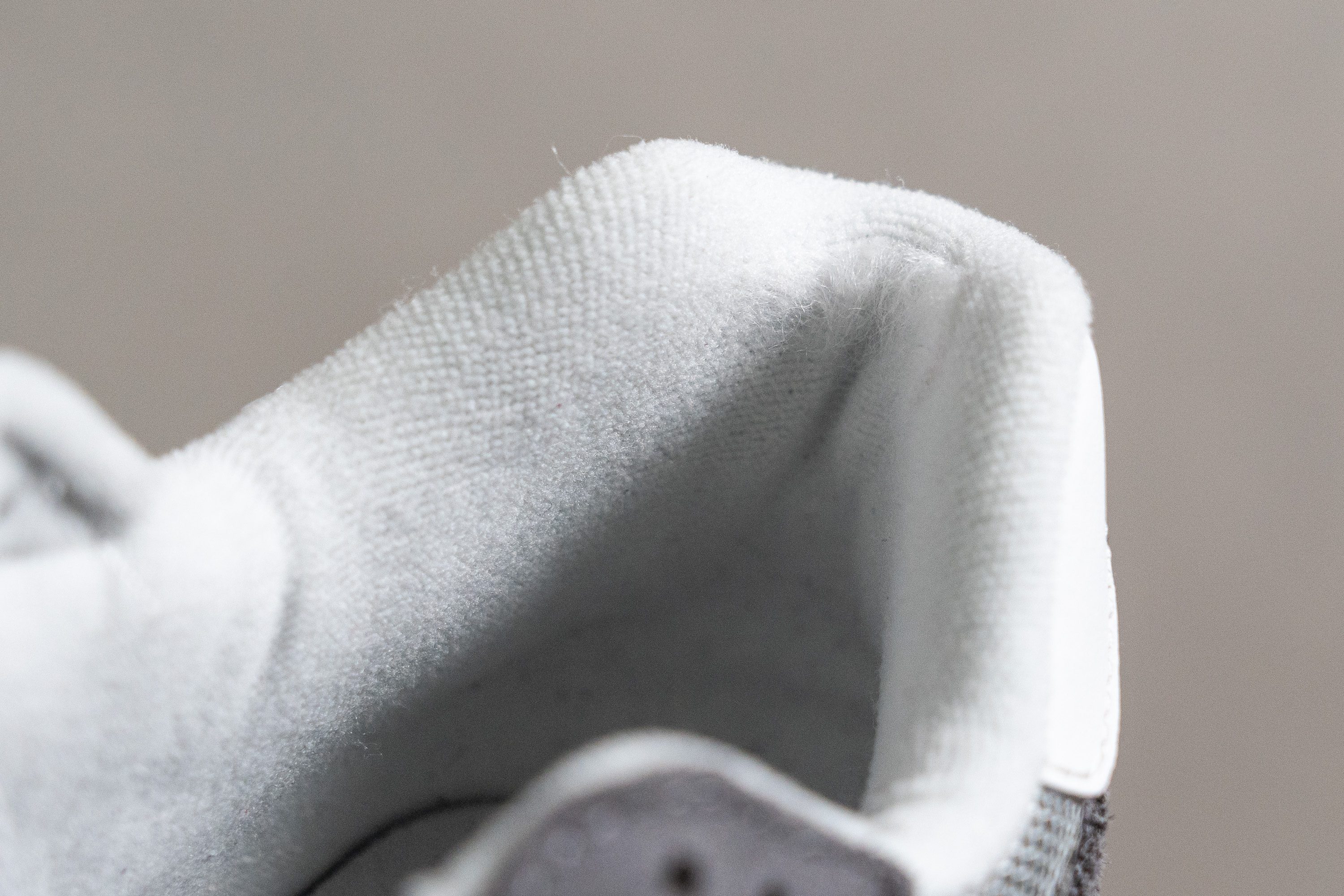
The 57/40 gets yet another high durability score - this time, for the heel lining.
| 57/40 | 4 |
| Average | 3.2 |
Outsole hardness
Visually, the rubber outsole on the New Balance 57/40 seems like a very sturdy compound.
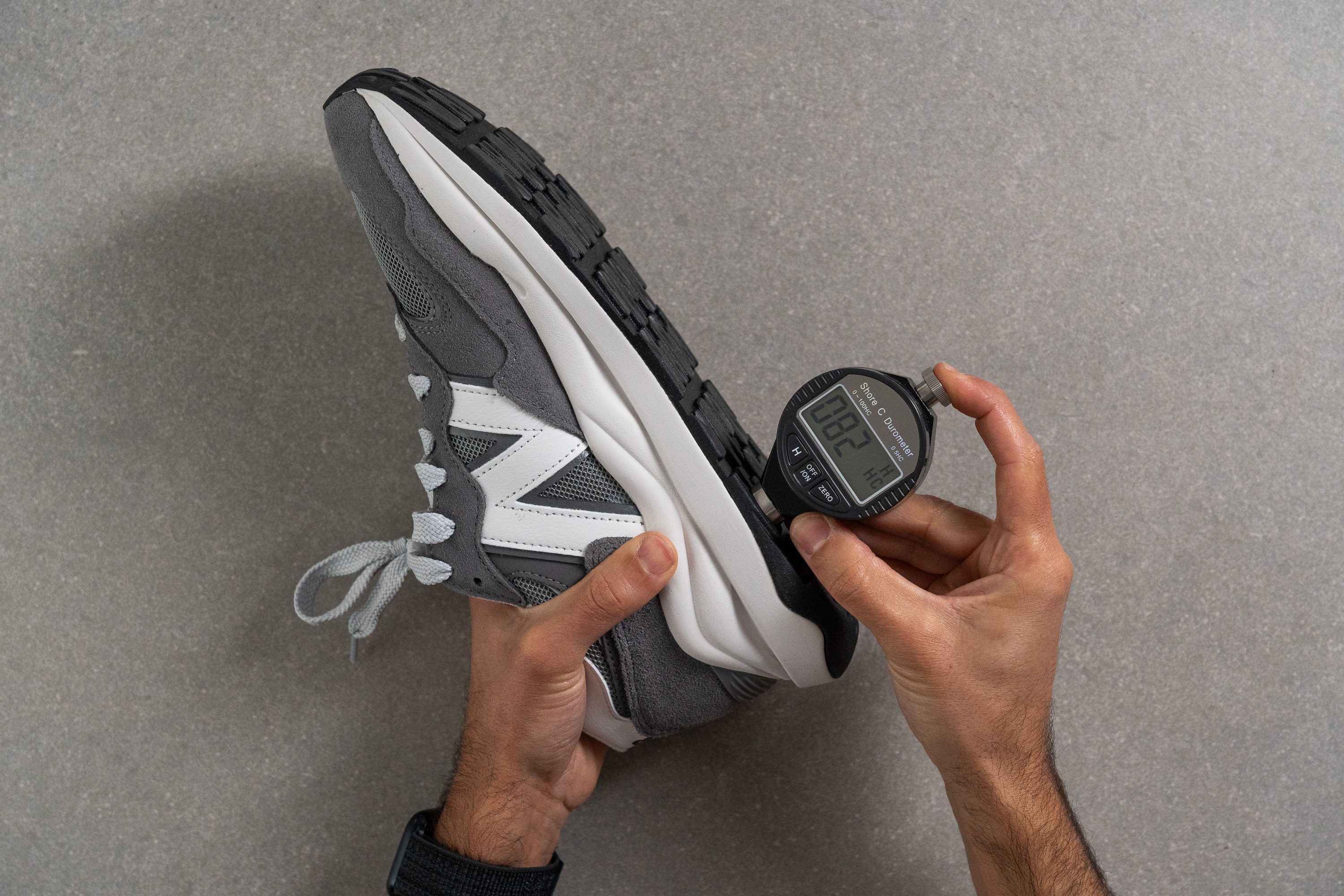
Measuring its hardness with a Shore C durometer proved our first impression. The tool showed a high reading of 83.0 HC which is sufficiently hard for day-to-day use in the city.
| 57/40 | 83.0 HC |
| Average | 85.7 HC |
Outsole durability
To check how well the shoe's outsole stands up to abuse, we turned our Dremel to a higher speed of 10K RPM. We also held its sandpaper tip against the rubber for a longer time period of 22 seconds.
New Balance sneakers never disappointed us in the durability department and the 57/40 continued that trend. Can you even see the damage caused by the Dremel in the photo below?
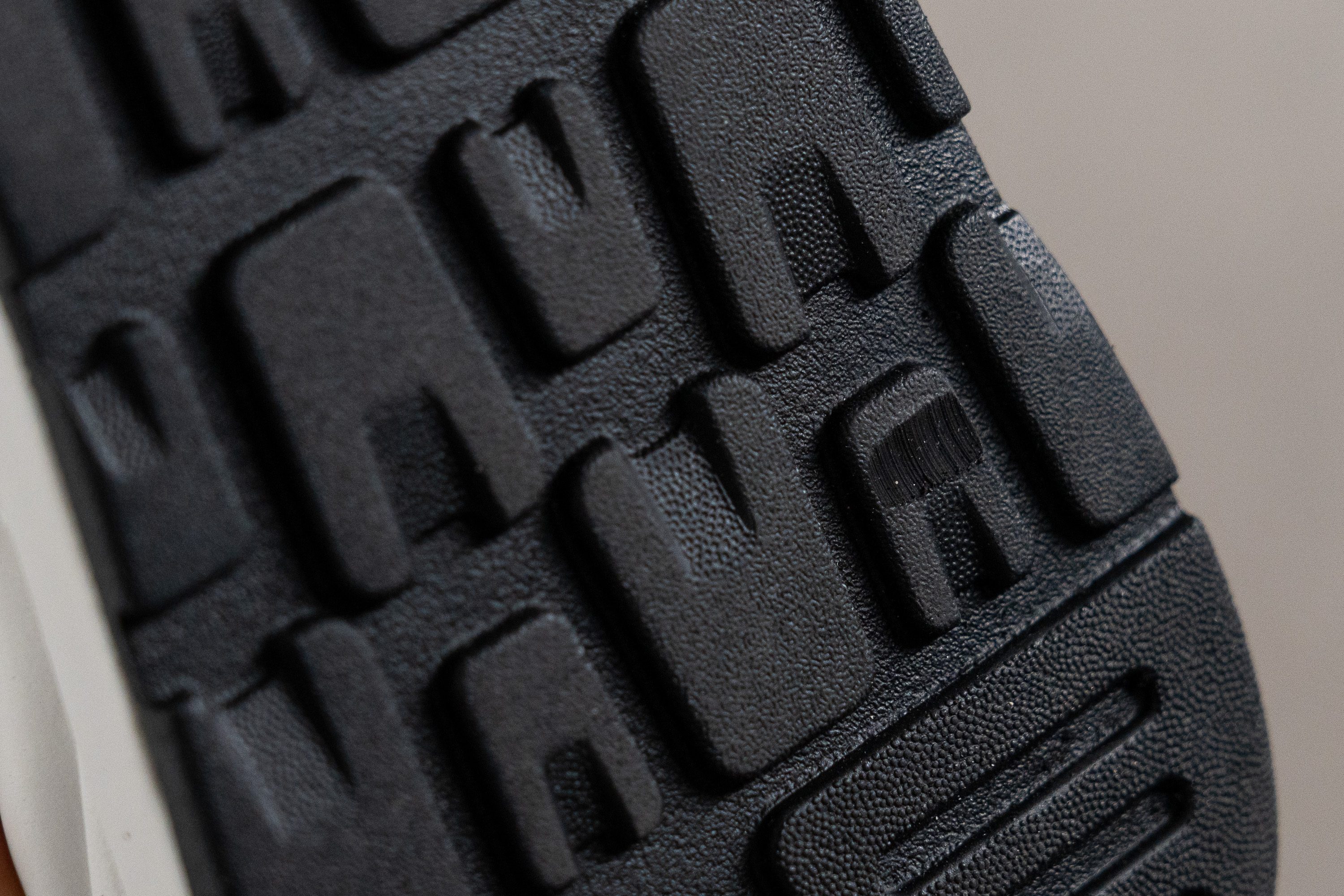
With a dent depth of only 0.7 mm, the shoe got even less damaged than the average! Very promising result for a casual sneaker.
| 57/40 | 0.7 mm |
| Average | 1.1 mm |
Outsole thickness
On top of it all, New Balance also chose a thick layer of rubber to protect the bottom of the 57/40.
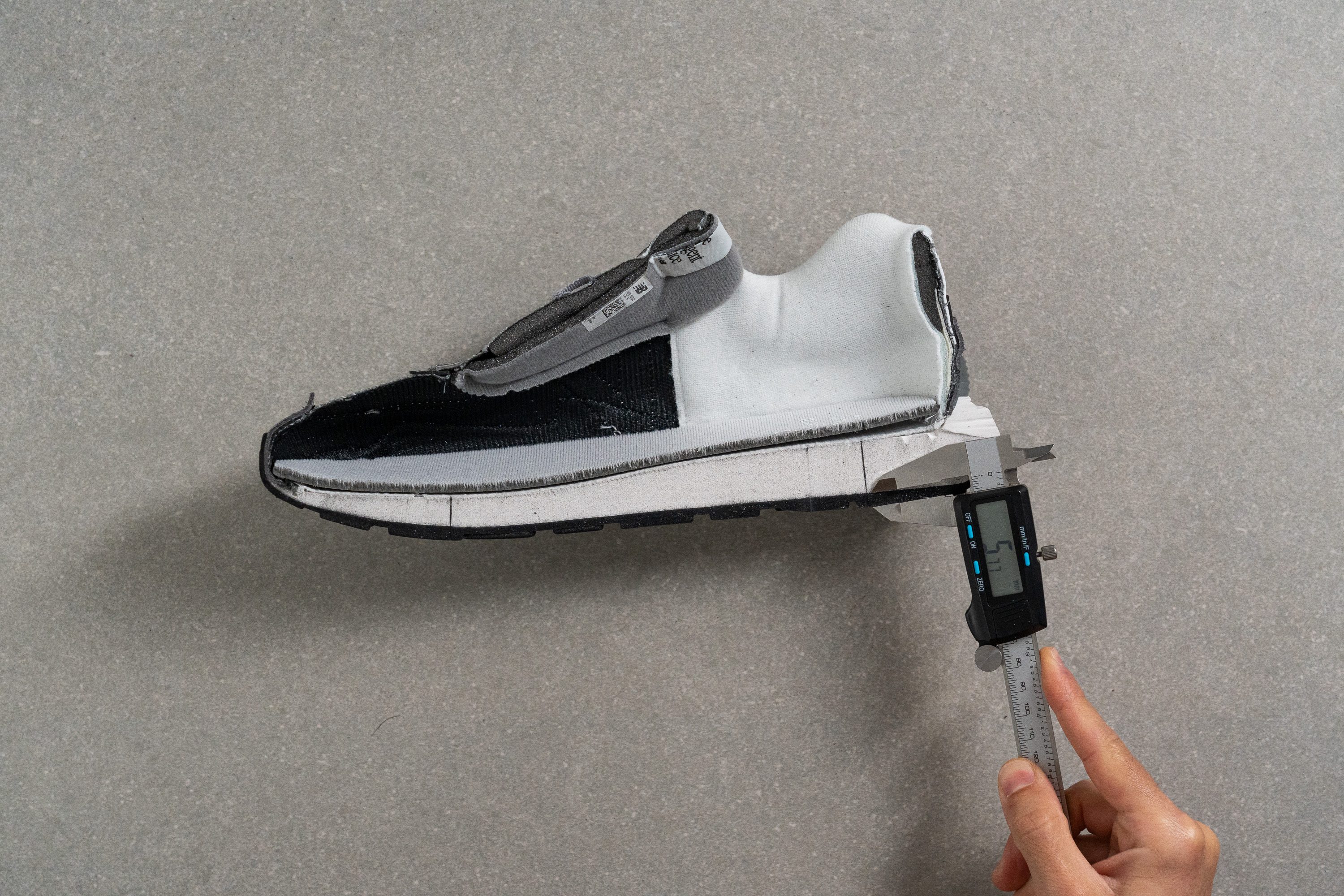
According to our caliper, the shoe's outsole is just as thick as the average at 5.8 mm. That's a great deal of rubber!
Considering all our findings above, we expect the New Balance 57/40 to last just as much or even longer than your standard pair of kicks. It should serve you well over one season for sure. Great investment considering the shoe's reasonable price!
| 57/40 | 5.8 mm |
| Average | 5.3 mm |
Misc
Insole thickness
The shoe's insole is not very thickly padded with only 4.2 mm of material in the heel. But we didn't find it to be a problem given the abundance of the primary cushioning.
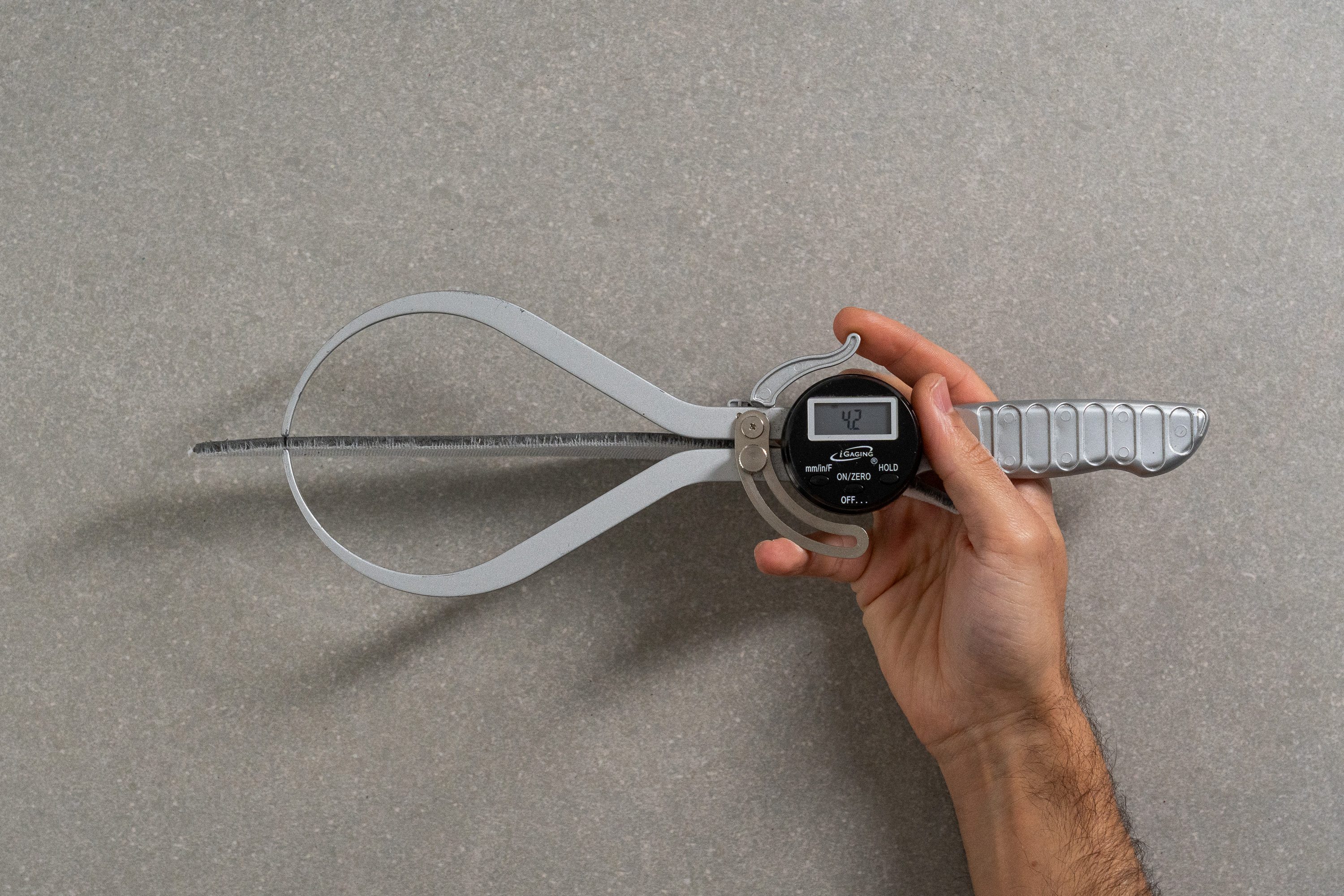
| 57/40 | 4.2 mm |
| Average | 5.1 mm |
Removable insole
The stock insole of the 57/40 can be removed or replaced with ease. But we are always happy with the insoles provided by New Balance because the brand knows exactly what it's doing! It's what the company began with in the first place.
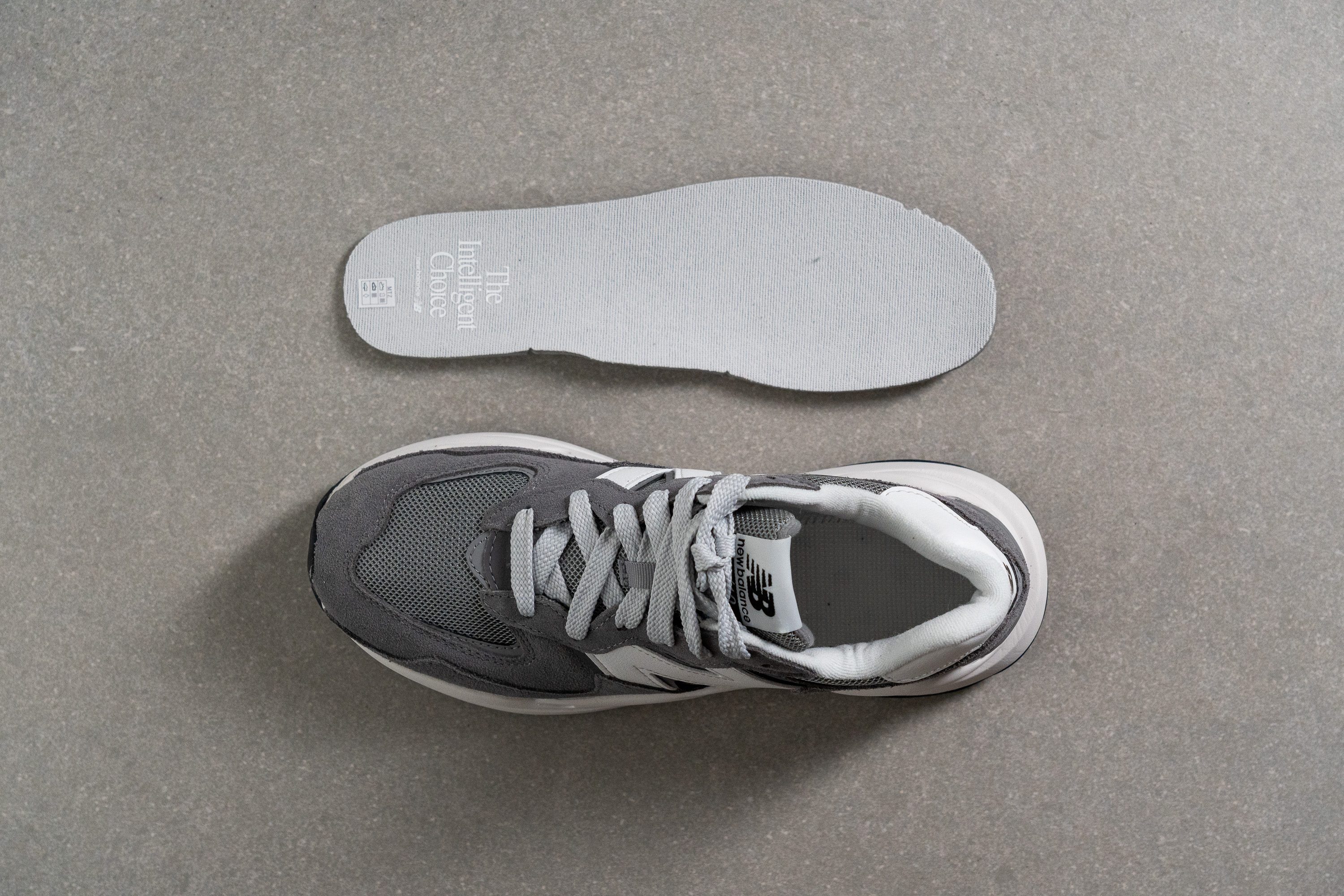
P.S. Considering all the benefits offered by the 57/40, we can only agree with the writing on its insole.
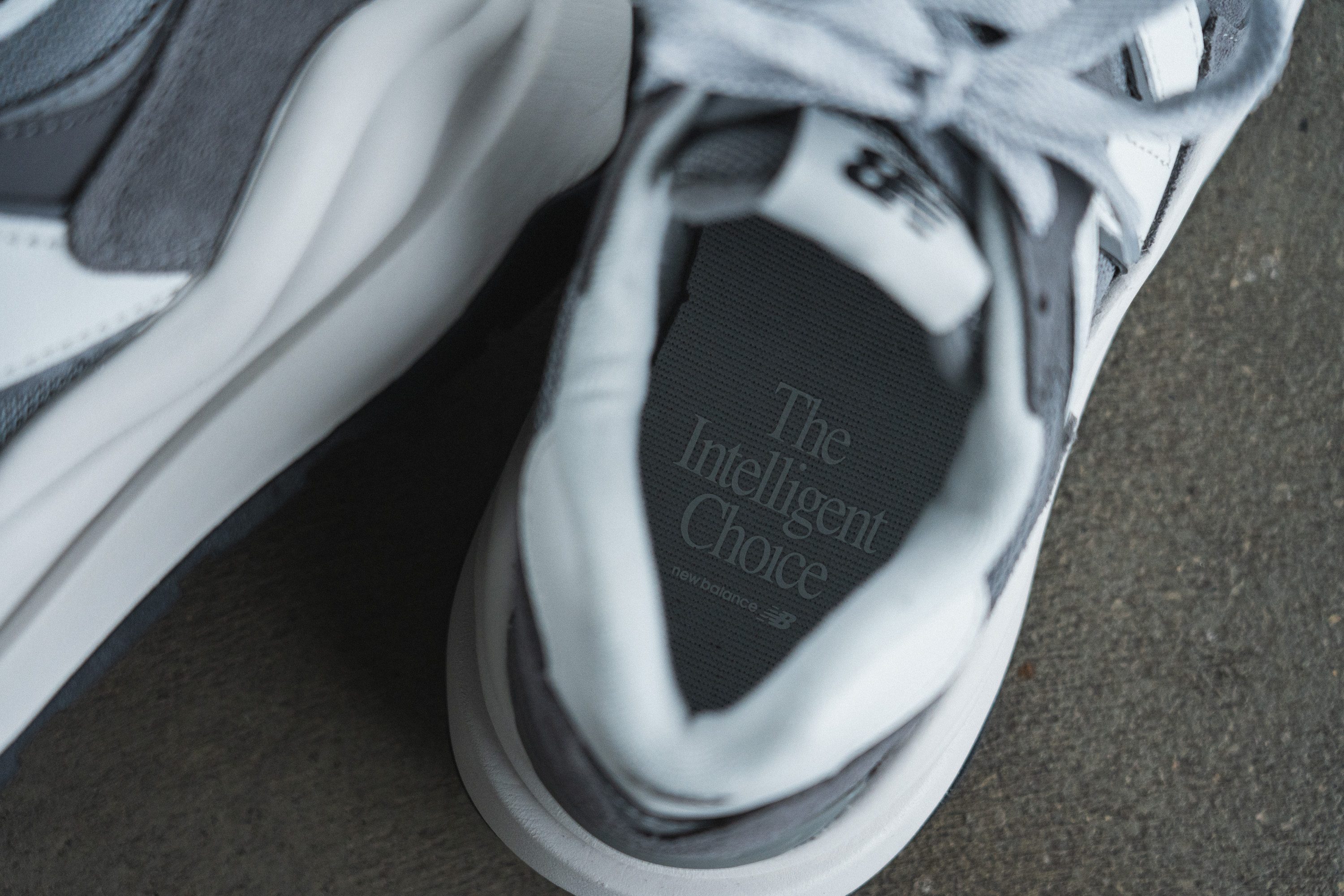
| 57/40 | Yes |
Reflective elements
The New Balance 57/40 is advertised as a reflective sneaker but we didn't find any in our grey colorway...Maybe other color options are more lucky?
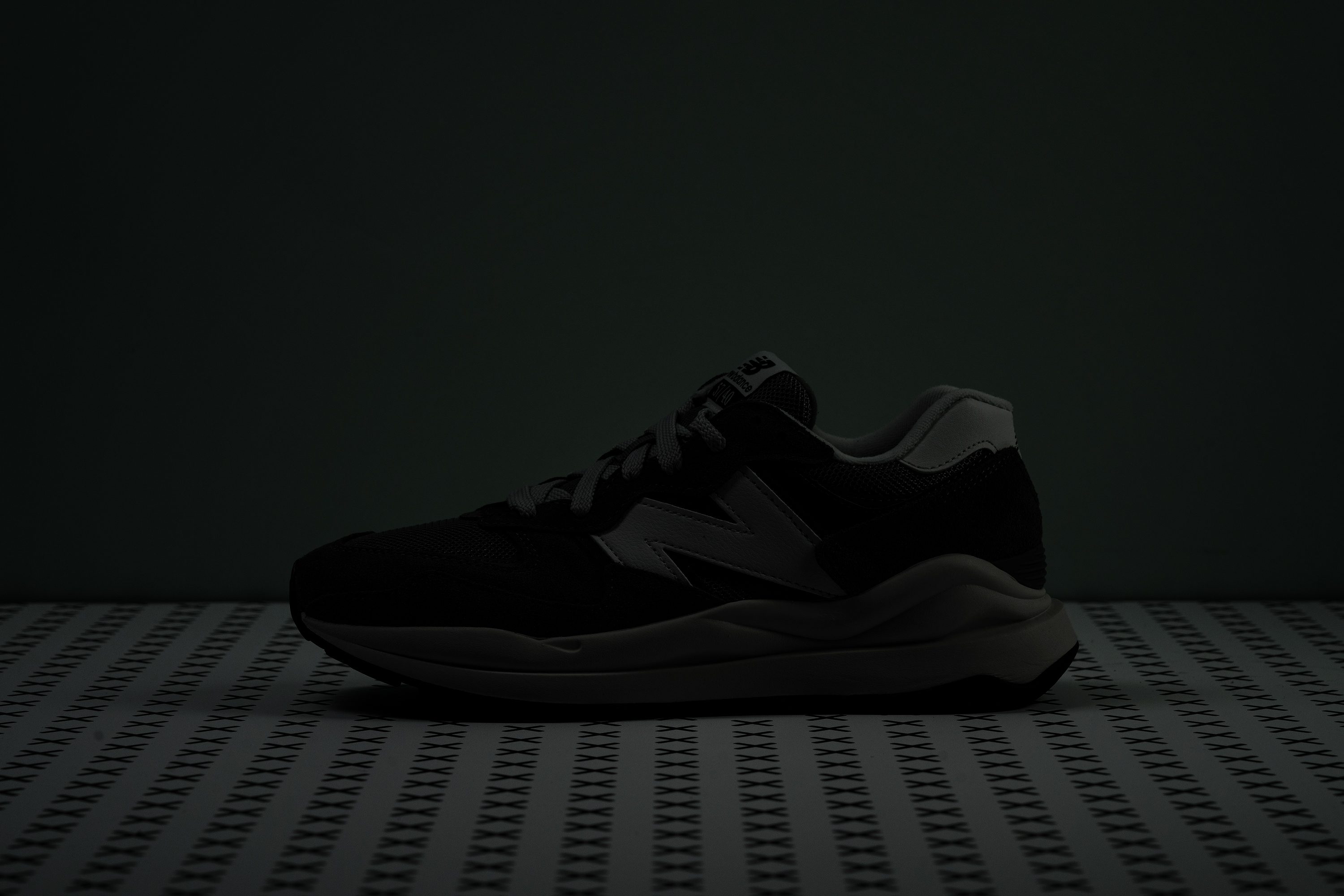
| 57/40 | No |
Tongue padding
Our feet were free from lace bites thanks to the shoe's well-padded tongue. With a foam padding of 9.4 mm, it is just as thick as the average sneaker tongue.
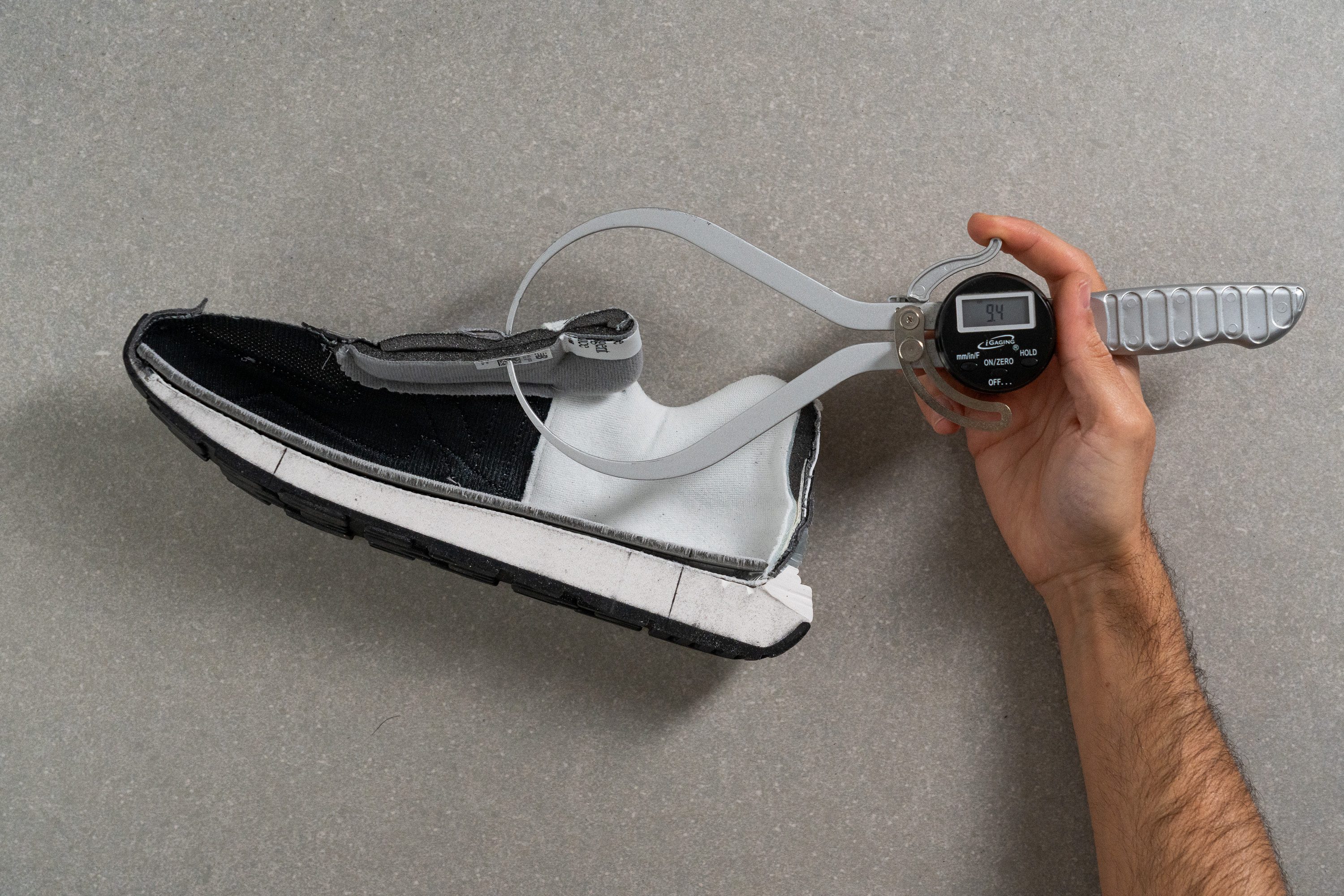
| 57/40 | 9.4 mm |
| Average | 9.6 mm |
Tongue: gusset type
There are no gussets on the tongue of the 57/40.
Even though this might cause tongue sliding for some people, we didn't experience any issues.
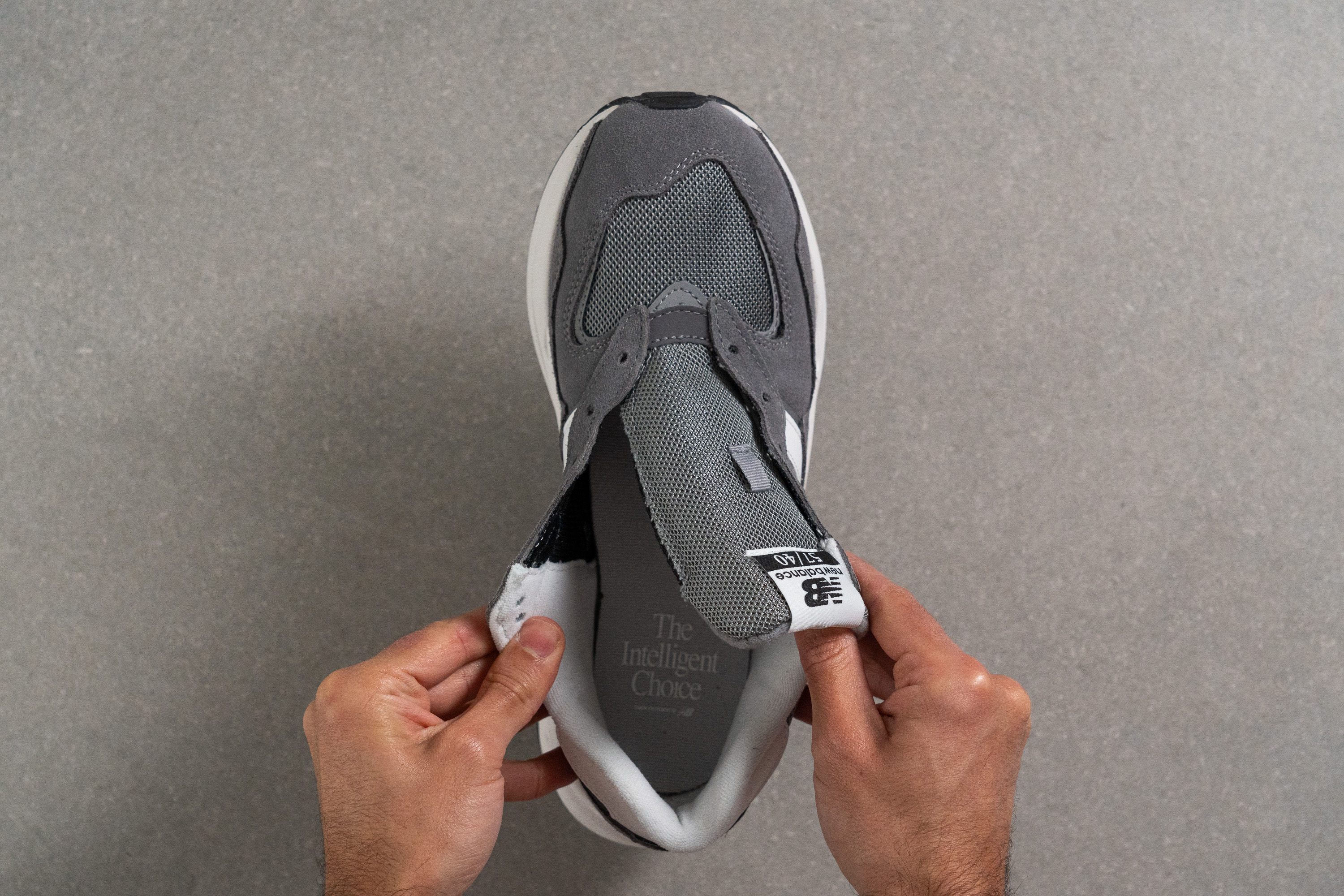
| 57/40 | None |
Heel tab
The NB 57/40 doesn't feature any pull tabs or finger loops but the on-and-off is pretty easy thanks to the shoe's structured collar and easy-to-work-with laces.
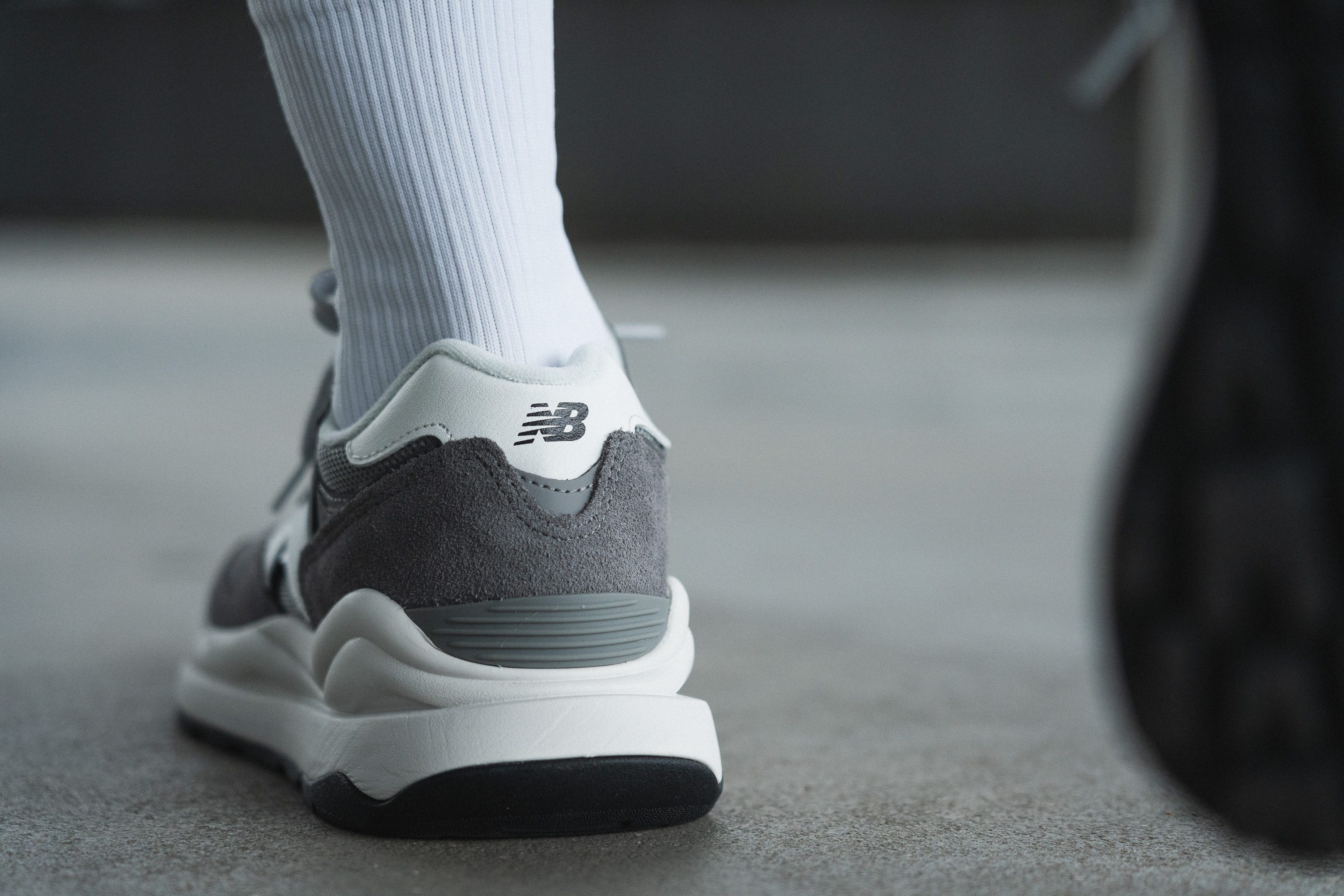
| 57/40 | None |

